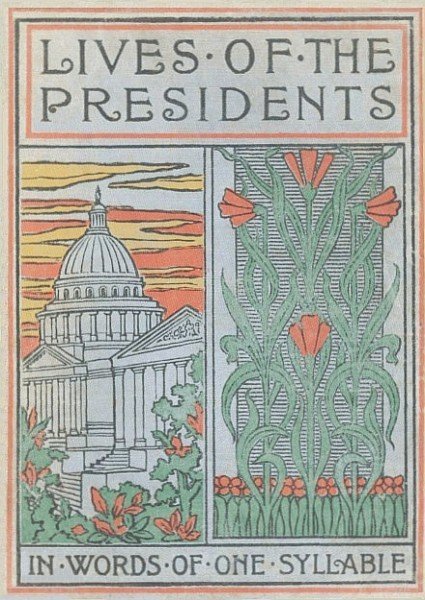
The Project Gutenberg EBook of Lives of the Presidents Told in Words of One Syllable, by Jean S. Remy This eBook is for the use of anyone anywhere at no cost and with almost no restrictions whatsoever. You may copy it, give it away or re-use it under the terms of the Project Gutenberg License included with this eBook or online at www.gutenberg.org Title: Lives of the Presidents Told in Words of One Syllable Author: Jean S. Remy Release Date: March 18, 2009 [EBook #28350] Language: English Character set encoding: ISO-8859-1 *** START OF THIS PROJECT GUTENBERG EBOOK LIVES OF THE PRESIDENTS *** Produced by Chris Curnow, C. St. Charleskindt, Michael and the Online Distributed Proofreading Team at https://www.pgdp.net
This ebook retains the hyphenation and punctuation variations of the original text.
A few typographical corrections have been made. Details of these changes can be found in a second Transcriber's Note at the end of this text.

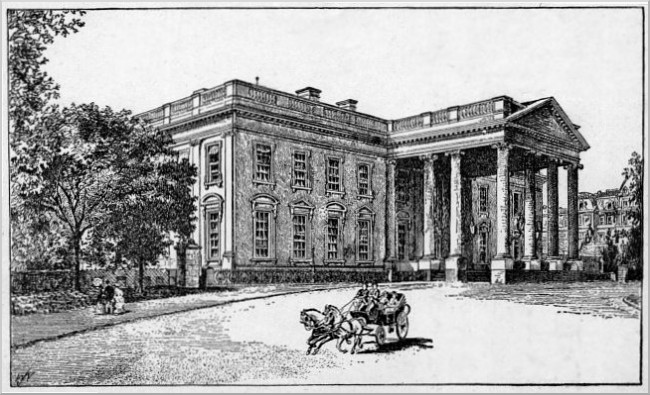 THE WHITE HOUSE—HOME OF THE PRESIDENTS.
THE WHITE HOUSE—HOME OF THE PRESIDENTS.
| George Washington. | 1 |
| John Adams. | 16 |
| Thomas Jefferson. | 20 |
| James Madison. | 25 |
| James Monroe. | 29 |
| John Quincy Adams. | 33 |
| Andrew Jackson. | 38 |
| Martin Van Buren. | 43 |
| William Henry Harrison. | 45 |
| John Tyler. | 47 |
| James Knox Polk. | 49 |
| Zachary Taylor. | 52 |
| Millard Fillmore. | 54 |
| Franklin Pierce. | 56 |
| James Buchanan. | 58 |
| Abraham Lincoln. | 60 |
| Andrew Johnson. | 66 |
| Ulysses Simpson Grant. | 68 |
| Rutherford B. Hayes. | 73 |
| James Abram Garfield. | 75 |
| Chester Alan Arthur. | 78 |
| Stephen Grover Cleveland. | 80 |
| Benjamin Harrison. | 83 |
| William McKinley. | 86 |
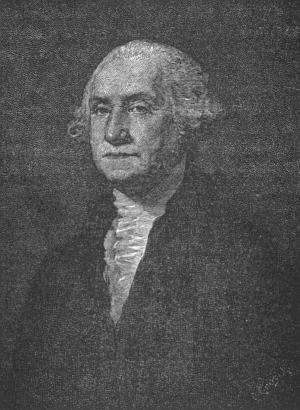 GEORGE WASHINGTON.
GEORGE WASHINGTON.
Way down in Vir-gin-i-a, near a small creek, called Bridg-es Creek, there is a shaft of white stone;—on it is the name of George Wash-ing-ton and the date of his birth: Feb-ru-ar-y 22d, 1732.
On this spot once stood the big brick house in which George Wash-ing-ton was born; it was built in 1657 by John Wash-ing-ton; his grand-son, Au-gus-tine, was the fa-ther of the lit-tle boy who be-came our first pres-i-dent. The moth-er of George Wash-ing-ton was Ma-ry Ball; so sweet and fair was she, when she was a young girl, that she was known as "Sweet Mol-ly."
Now she was not the first wife of Au-gus-tine Wash-ing-ton; and he had two boys, Law-rence and Au-gus-tine, when he made her his wife. These boys were so kind to their small broth-er George, when he was young, and gave him so much help, all through his life, that their names should stay in your minds. When George was three years old his home was burned to the ground, and his fa-ther built a fine new house, just o-ver the riv-er from where the cit-y of Fred-er-icks-burg now stands. Here George went to his first school, and the name of the man who taught him was so queer, it will not go out of your mind;—it was "Hob-by." In those old days, the boys wrote to their boy-friends, [Pg 2] just as they do at this day. See what George, when he was nine years old, wrote to his best friend, Rich-ard Hen-ry Lee:—"Dear Dick-ey, I thank you ver-y much for the pret-ty pic-ture book you gave me. Sam asked me to show him the pic-tures and I showed him all the pic-tures in it; and I read to him how the tame el-e-phant took care of his mas-ter's lit-tle boy, and put him on his back and would not let an-y-bod-y touch his mas-ter's lit-tle son. I can read three or four pages some-times with-out miss-ing a word. Ma says I may go to see you and stay all day with you next week if it be not rain-y. She says I may ride my po-ny. He-ro, if Uncle Ben will go with me and lead He-ro. I have a lit-tle piece of po-et-ry a-bout the book you gave me, but I mustn't tell you who wrote the po-et-ry.
"I am go-ing to get a whip top soon, and you may see and whip it."
You see the boys in those old days were fond of books, and toys and hors-es just as the boys of to-day are; and there is a tale of George, and a young colt, which shows that he was a brave and strong boy, who did not fear to tell the truth, though he had done wrong. He and some of his boy-friends were in a field, in which were kept some young colts, some of which had been used.
The boys caught one colt, put a bit in its mouth, and held it, while George sprang on its back. The colt, mad with [Pg 3] fear, sprang in the air, tore through the field, and tried in vain to throw the boy; at last he leaped with such force, that he broke a blood ves-sel, and fell to the ground dead. Just at this time George's moth-er came out, and saw the dead colt. She asked the boys if they knew how he died. "Yes, mad-am," at once said her own boy; and then he told the whole truth. There are more tales of the boy-life of George and all show that he was a brave, strong boy, full of life and fun, and at the head in games and sports of all kinds.
His fa-ther died when he was on-ly e-lev-en (11) years old; but his moth-er lived to be an old, old la-dy, who was, you may be sure, ver-y proud of her great son.
Af-ter his fa-ther's death George made his home with his broth-er, Au-gus-tine, un-til he was six-teen (16) years old; and the short notes which he wrote to his moth-er were not like those he sent to his boy-friends, or like those which you boys and girls write to-day. He be-gan, "Hon-ored Mad-am;" and end-ed the stiff lit-tle note,—"Your du-ti-ful son."
In those days folks lived on great big farms, or plan-ta-tions, as they were called, and raised to-bac-co, which was sold for much mon-ey in Eng-land. George's fa-ther had a ver-y large plan-ta-tion and ma-ny slaves to work on it; some day this would all be-long to George, and so he was taught how to write in a big round hand, how to do sums, and to look out for those who were in his care.
All through these years there was talk of war; for a cru-el war be-tween the French and Eng-lish, known as King George-'s War, had be-gun; and the boys, who heard so much talk of war, of course played at it; and George was ev-er at the head, ev-er lead-ing these bands of young sol-diers; [Pg 4] he longed, just as boys would to-day, to throw a-way his books, to leave school, to go to the true war and bear a real gun; and when he was fif-teen, his broth-er Law-rence, who was a sol-dier, tried to make his moth-er let him join the na-vy, as he was too young to go to the war. But this moth-er was a ver-y wise wo-man, and said no; that his place was at home un-til he knew how to care for the great plan-ta-tion and the ma-ny slaves that in five or six years would be his.
Now, at this time, this great land of ours was so wild that it was hard to tell how much land a man owned, just where one great farm end-ed and the next be-gan; and a man who knew the land so well that he could tell folks just these things would be of much use; so George now be-gan to give much time to just this work; and so well did he do it that soon folks came to him when they were in doubt.
In fact this work led, as you shall see, straight up to the pres-i-dent's seat. His broth-er Law-rence had mar-ried Anne Fair-fax, and in their home at Mt. Ver-non George met ma-ny great men; a-mong oth-ers was Lord Thom-as Fair-fax, who owned a piece of land so large that he did not know how big it was; he sent George to find this out; and now this young boy had a rough piece of real work to do.
In March, 1748, he and a young friend, George Wil-liam Fair-fax, left the ease of Mt. Ver-non to live in the wild woods, where they would see on-ly Indians, or, at the best, rough white men; in the log huts of the white men they found so much dirt that, af-ter one tri-al, rath-er than sleep on dir-ty straw, with no sheet, and but one torn, thin blan-ket, they ei-ther lay on the bare floor, near the big wood-fire, or else built a huge fire in the woods and lay close to it on the earth. They had to swim their hors-es o-ver streams; they [Pg 5] shot wild deer and birds, and of-ten cooked and ate them, alone in the great wild woods, far from e-ven the camp of the In-di-ans. Once, at least, we know, from a little book in which each night George wrote of what they had done that day, that they saw a grand war-dance of the In-di-ans; the mu-sic by which they danced was made by a pot half full of wa-ter, with a deer-skin o-ver the top, and a gourd filled with shot; this must have made queer mu-sic to dance by.
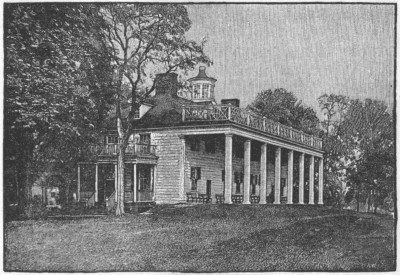 MOUNT VERNON—THE HOME OF WASHINGTON.
MOUNT VERNON—THE HOME OF WASHINGTON.
The boys were gone six weeks, and did their work so well that the gov-ern-or heard of it, and he made George a "pub-lic sur-vey-or;" that is, it was his place to find out the size of all the new farms; and his word was to be law. He must have done this work well, too, for the lines which he laid [Pg 6] down were the ones used by the new States years and years af-ter his death.
Now, for weeks at a time, he was a-lone in the woods with the In-di-ans; liv-ing in their camps, and learn-ing of their life; they taught him ma-ny things; and they, in turn, learned to love and trust him; this lone-ly life made him a grave and qui-et man; one who talked lit-tle; and it taught him to think for him-self, at an age when most boys are told what to do by their par-ents and friends.
When he was not in the woods, hard at work, he was at Mt. Vernon; and here the talk was of the great lands in the west; and of the war bet-ween the Eng-lish and the French, who were each try-ing to drive a-way the oth-er, and were both try-ing to force out the In-di-ans. It was pret-ty hard for the In-di-ans, who now had not on-ly to fight each oth-er, but the white men, too. At last they took sides, some with the Eng-lish, some with the French; and a fierce war broke out o-ver the land near the O-hi-o River; no white men had yet lived there, and both sides wished to own it.
The French moved ver-y fast, and built great forts, and sent men there to keep the Eng-lish a-way; it was no "play-war" in which Wash-ing-ton now took part; he had real men under him; but, just as he be-gan to learn what real war was, he had to go to the West In-dies with his broth-er Law-rence, who was ver-y sick. They spent the win-ter there, but Law-rence did not get well, and came back to Mt. Ver-non in the spring, where he died in Ju-ly, 1752.
He left his land in charge of Wash-ing-ton, who now made his home there; and when his broth-er's daugh-ter died he be-came the own-er.
Now, while Wash-ing-ton had been a-way, the French had been ver-y ac-tive; they had made friends with the In-di-ans, [Pg 7] and had e-ven dared to send some Eng-lish tra-ders in a ship to France.
At this act Eng-land was up and in arms, and sent o-ver great ships and ma-ny men to help fight the French. The first step that Eng-land took was to send men to warn the French a-way from the Eng-lish forts in Penn-syl-va-ni-a; and Wash-ing-ton, who knew bet-ter than a-ny one else the rough wild woods, and who was a friend of the In-di-ans, led a lit-tle band of sev-en men through the dense, dark woods and o-ver riv-ers filled with float-ing ice, up to the French lines. He told the chief man of the French troops just what the Eng-lish said, but this French man would not give up one inch of ground that he had won from the In-di-ans, and gave Wash-ing-ton a note to take back with him, in which he said as much.
Of course Eng-land could take but one course now; and so the long, fierce war known as the "Sev-en Years' War" be-gan. Wash-ing-ton was made a colo-nel, and showed so much skill, and was so brave, that in a short time he took charge of part of the troops of Gen-er-al Brad-dock.
In June, 1755, the troops made a start for Fort Du-quesne, where they were to stay; and on this trip, while they were deep in the woods, the In-di-ans, with fierce shrieks and wild cries, sprang on them from the rocks and trees. The horse on which Wash-ing-ton rode was shot; Gen-er-al Brad-dock got such a wound that he died, and ma-ny poor men were killed. Here again Wash-ing-ton act-ed so brave-ly, and was so wise, that the sol-diers said that Brad-dock had lost the day and Wash-ing-ton had saved the ar-my.
At Brad-dock's death Wash-ing-ton was made chief of all [Pg 8] the troops in the col-o-nies; and the first thing he did was to place men near the homes which the white men were mak-ing in the new lands, and so help these ear-ly set-tlers to stop the In-di-ans when they came to rob them and to burn up their lit-tle log cab-ins, for a great fear of the red men was o-ver all the land. Now, when the war came to a close with the fall of the French, we find that Wash-ing-ton is a very great man, that his troops love him ver-y much, and that the heads of the states feel that he is a strong, wise man, and one whom they can trust. All this time, you know, he was an Eng-lish sol-dier, fight-ing for Eng-land; but, deep in his heart, and in the hearts of all the brave men who fought with him, there was, we may be sure, a love for this fair land, and a long-ing for its best good.
After the war was at an end Wash-ing-ton, who was ver-y glad to give up his post, mar-ried Mrs. Eus-tis, a young wid-ow with two lit-tle chil-dren, a girl of six years and a boy of twelve, and went to Mt. Ver-non to live. For twen-ty years now he lived the qui-et life he loved so well. He took good care of his farm, was hap-py with his fam-i-ly and friends, and grew, day by day, in power. He did not lead an i-dle life, you may be sure; he rose ear-ly, had his break-fast at sev-en in sum-mer and eight in win-ter; then rode o-ver his farm and saw that all was right. He had his din-ner at two o'clock; then had an ear-ly tea, and of-ten was in bed by nine o'clock. Twice a year he sent to Lon-don for things need-ed in the way of dress for his fam-i-ly and slaves, for tools, books, drugs, etc. Some of the things he bought for the chil-dren I think you boys and girls would like, too. He sent for "tops, lit-tle books for chil-dren to read, a doll, and oth-er toys."
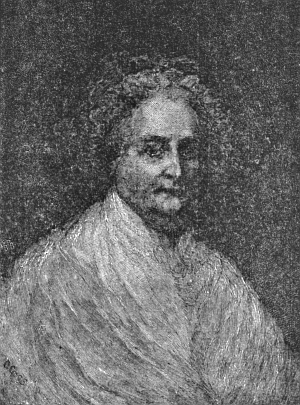 MARTHA WASHINGTON.
MARTHA WASHINGTON.
Wash-ing-ton loved hors-es and was ver-y fond of hunt-ing. The name of his pet horse was "Blue-skin"; he must have looked ver-y fine when he was on horse-back; for he was a big man, with bright blue eyes and high color, and he wore a red vest with gold lace on it, and a dark blue cloth coat. Mrs. Wash-ing-ton rode in a fine car-riage drawn by four hors-es, and her driv-er wore the Wash-ing-ton col-ors of red, white and gold. These old days were full of life and [Pg 10] fun, but there was work as well, and soon came more talk of war.
All through these twen-ty years this land was grow-ing big-ger and big-ger; and at last came the time when folks did not see why they should not be free from Eng-land and rule their own land in their own way.
At last Eng-land made a law called the "Stamp Act," which put so high a tax on goods that folks here would not pay it; tea was one of the things on which this tax was put; and when Eng-land sent o-ver three ships full of tea to Bos-ton, our men would not let it be ta-ken from the ships, but broke the great chests and threw all the tea in the wa-ter. This act is known as the "Bos-ton Tea Par-ty"; and now the first signs of war were seen; a fierce fight took place at Lex-ing-ton, one Sun-day morn-ing, be-tween the Brit-ish and A-mer-i-can troops; and now, all o-ver the land, went up the cry, "To arms! To arms!"
This is how the great War of In-de-pend-ence be-gan; and you know the name of the man who was at once put at the head of the A-mer-i-can ar-my—George Wash-ing-ton, of course! Now he is not an Eng-lish-man fight-ing for his king, but an A-mer-i-can fight-ing to free his own land. A long, hard fight it was, too, but not once did Wash-ing-ton or his brave men lose heart. He drove the Brit-ish out of Bos-ton, and then, for fear they would go to New York, he sent men there; but the Brit-ish ships went to Can-a-da in-stead, and made that land theirs.
It was just at this time that Rich-ard Hen-ry Lee, the boy-friend of Wash-ing-ton, made a move in Con-gress that our land should say to the whole world that it would be free from Brit-ish rule; and so the Dec-lar-a-tion of In-de-pend-ence was drawn up and sent out to the world on July 4, 1776.
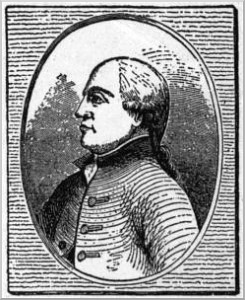 LIEUTENANT-GENERAL BURGOYNE.
LIEUTENANT-GENERAL BURGOYNE.War now be-gan in dead-ly earn-est; and, at the great bat-tle of Long Isl-and, our men met with great loss of life, and had to flee from the foe. Soon af-ter this bad news the Brit-ish took Phil-a-del-phi-a, and now Wash-ing-ton was sad at heart; on Christ-mas day of 1776, though, our troops won in the great fight that took place at Tren-ton, and there was joy in the whole land; good news came with the New Year, too, for Wash-ing-ton won ma-ny fights; and at last, in Oc-to-ber, 1777, the Brit-ish troops in charge of Gen-er-al Bur-goyne gave up their arms to Gen-er-al Gates. That win-ter of 1777 was a bad one for Wash-ing-ton and his men; at no time in the war did they suf-fer so much; the time was spent at Val-ley Forge, and the men lived in log huts which they had first built, in long straight lines, like cit-y streets; twelve men lived in each hut, and there was a fire-place at the back, but no fire could keep out the aw-ful cold, and no hut was snug e-nough to keep out the snow that fell in great drifts a-round this lit-tle town of log huts. To make things worse there was lit-tle food to be had; the men had on-ly poor, thin clothes, and their bare feet oft-en left marks of blood on the white snow. But the men did not lose hope, and kept their faith through all the long months in their great lead-er, whose lot was quite as hard as theirs was; the farm-house in which he had a room still stands, and it is hard to be-lieve, as you look at this old house on the banks of the Del-a-ware Riv-er, that once the big or-chard back of it and [Pg 12] all the pret-ty fields were filled with poor little wood-en huts in which, for the sake of free-dom, lived and suf-fered thou-sands of brave men.
In the spring things were bet-ter, for France joined A-mer-i-ca in her fight for free-dom, and three years from this time the Brit-ish were beaten at York-town and A-mer-i-ca was free. One of the great French-men, who gave us much help, and was a firm friend of Wash-ing-ton's, was the Mar-quis de La-fay-ette.
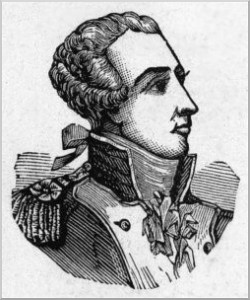 MARQUIS DE LAFAYETTE.
MARQUIS DE LAFAYETTE.
A ver-y sad thing dur-ing these last years of the war was the base act of Ben-e-dict Ar-nold, who made up his mind to sell to the Brit-ish some posts near West Point, of which he had charge. He sent a note to Clin-ton by a young Brit-ish spy, Ma-jor An-dre; but on his way to the Brit-ish lines this young man was caught by three of our men. They found the note in his boots and he was brought to the A-mer-i-can camp, tried for his life and hung as a spy. Ben-e-dict Ar-nold had made his way to a ship and set sail for Eng-land, and his name is hat-ed, not on-ly by his own land, but by e-ven the land to whom he tried to sell his coun-try.
It was in March, 1783, that the news of peace spread through the land, and it is said that Wash-ing-ton wept with joy, as he read the glad news to his troops; he gave or-ders that the whole ar-my should give thanks to God; and this was done at a great meet-ing on the day af-ter Lord Corn-wal-lis laid down his sword. Then there was a great ball giv-en at Fred-er-icks-burg, and Wash-ing-ton's old moth-er, [Pg 13] sev-en-ty-four years old, was there lean-ing on the arm of her son; and do you not think she was proud, as one af-ter an-oth-er of the great French of-fi-cers bowed to her, and spoke in her son's praise?
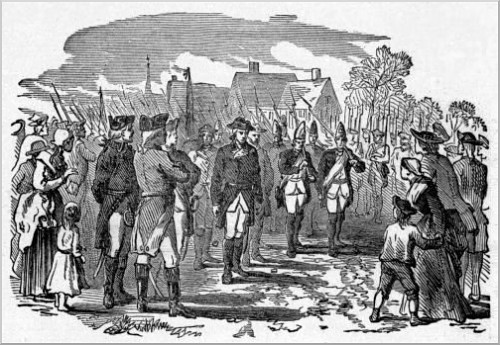 SURRENDER OF CORNWALLIS AT YORKTOWN.
SURRENDER OF CORNWALLIS AT YORKTOWN.
It was on Christ-mas eve that Wash-ing-ton came home to Mt. Vernon, af-ter eight years of war: rid-ing in state, with his wife at his side, this great A-mer-i-can, feared now by kings, and loved more than ev-er by the coun-try he had made free, came glad-ly back to take up the qui-et coun-try life he loved so well; and here, could he have had his way, he would have lived un-til his death; but this new coun-try need-ed at its head a man whom folks loved and trust-ed, and of whom oth-er lands stood in fear. No man but Wash-ing-ton could fill this great place; and so, at the end of three [Pg 14] years, once more at his coun-try's call, he left his home,—this time to be-come the first Pres-i-dent of the U-ni-ted States. Not one voice was a-gainst him; eve-ry man in the new coun-try vot-ed to give him this last hon-or; and on Ap-ril 30th, 1789, in New York Ci-ty, he took the oath of of-fice. Wash-ing-ton, who was a ve-ry rich man, had tak-en no mon-ey for serv-ing his coun-try in the war; and said he would take none now; but be-cause oth-er Pres-i-dents might not be rich e-nough or good e-nough to want to do the same, the peo-ple made him take $25,000 a year; now, you know, the Pres-i-dent gets $50,000 a year.
Wash-ing-ton was in New York but one year, then the cap-i-tal was moved to Phil-a-del-phia, and here he lived in great state, un-til af-ter eight years in the Pres-i-dent's chair, once more, and for the last time, he came back home to Mt. Ver-non.
At the end of his term of of-fice, Wash-ing-ton on-ly wait-ed to see the next Pres-i-dent, John Ad-ams, take the chair, and soon af-ter he came back talk a-rose of war with France; and, of course, the coun-try turned to him; he was a-gain put in charge of the ar-my, and took up the pub-lic life he had so glad-ly laid down. But he had not long to bear it this time, for on De-cem-ber 12th, 1799, while rid-ing in a hard rain-storm, he took a heav-y cold, from which he died on Sat-ur-day night, De-cem-ber 14th, be-tween ten and twelve o'clock.
Wash-ing-ton was bur-ied at Mt. Ver-non, and to-day the tomb of "The Fa-ther of his Coun-try," as he is lov-ing-ly called is a sa-cred place; not on-ly to us, but to the men and wo-men of the old lands, which were taught by him so long a-go to hon-or and fear this great, new A-mer-i-ca.
Wash-ing-ton had been dead just one hun-dred years on De-cem-ber [Pg 15] 14th, 1899, and the date was made much of in the U-nit-ed States: in New York Ci-ty, in Wash-ing-ton, and at Mt. Ver-non there was a great time in his hon-or, for this great man is as dear to his coun-try to-day as he was when he was a-live.
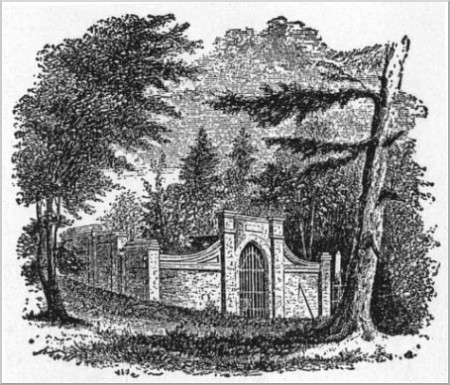 WASHINGTON FAMILY VAULT.
WASHINGTON FAMILY VAULT.
John Ad-ams was born, not in the far South with ma-ny slaves to wait on him, but on a small farm in Brain-tree, Mass. Here, from old Eng-land had come, in 1636, his great-grand-fa-ther, Hen-ry Ad-ams; and in this old home was born on Oc-to-ber 19th, 1735, John Ad-ams, who was to be the sec-ond Pres-i-dent of the U-nit-ed States. Now, on this farm in the east, there was much work to be done, and few to do it; the folks who had made their homes here did not lead such lives of ease as those who lived on the great farms in the South.
As a small boy, though, of course, he was taught to read and write, John Ad-ams had a good deal of hard work to do. There was wood to chop, and snow to be cleared a-way; there were hors-es and cows to care for, and there was much work to do in the fields. In all this work John took his part, like the brave, strong boy that he was. When the days grew long and cold, he was sent to an old school near his home, and here he at once took his place with the boys, as one who would lead in fun and sport of all kinds. There was a good deal of fun, too, in those days, for boys and girls both; in the cold days there was good, strong ice on which to skate; there was snow to play in, and to make fine roads for long rides in a sleigh; and, when the days were long and hot, there were fish in the big streams, and there was game in the wild woods. John was not fond of his books, but still he did good work at school; and when he was quite young went to Har-vard Col-lege. He left it in 1755, [Pg 17] just at the start of the "Sev-en Years' War"; and the name of George Wash-ing-ton, the brave young Col-o-nel of Vir-gin-ia, rang loud in his ears.
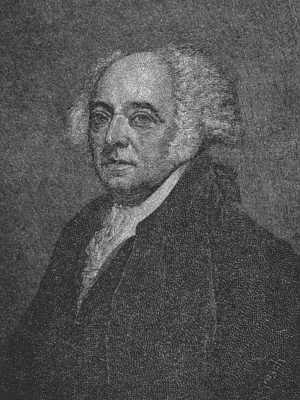 JOHN ADAMS.
JOHN ADAMS.
He taught school in Wor-ces-ter to earn the means to take up law; and in 1758 he be-came a law-yer. He had ma-ny cas-es, and grew wise and great, though he did not make much mon-ey, as folks in the small town of Brain-tree were far from rich and paid small fees. But he did make ma-ny kind friends, and far and near he was known as a man of clear, strong mind and quick, bright thoughts; he had a fine, sweet voice, too, and his speech-es were al-ways wise and showed much thought.
In the strife with Eng-land he was, from the start, on the side of A-mer-i-ca. So much did Eng-land fear him in 1757, the Eng-lish king sent word that he would give him great wealth if he would serve him at this time. Ad-ams would not do this; he would speak and act just as he thought right, and be bound by no king. When the "Stamp Act" passed in 1764, he made a great speech, which was sent to those at the head of his State; and when, in 1770, a troop of Brit-ish fired on a mob of A-mer-i-can men and boys in the streets of Bos-ton, he took the case to the courts, and spoke for the Brit-ish Cap-tain and his men, though they had killed five of our men. It may seem strange to you that Ad-ams, who stood for A-mer-i-can rights, should here take sides with the Brit-ish; but, first of all, he stood for law; and, though he knew he ran the risk of los-ing his high place in the hearts of A-mer-i-can men, still he would do what he thought right. But men love truth, and like to see a brave man act as he thinks right, and so felt that he had just the clear, cool head and brain and the strong warm heart to give aid in the dark days that were to come [Pg 18] to the land. He was sent to the First Con-gress and was one of the three men who drew up the Dec-la-ra-tion of In-de-pend-ence.
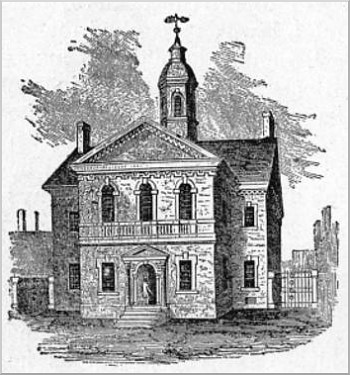 CARPENTER'S HALL.
CARPENTER'S HALL.He was al-so one of three men to go to France and ask for the aid which she gave to A-mer-i-ca, in the spring af-ter that hard win-ter at Val-ley Forge. Do you see why this trip at this time was a brave act, and one by which Ad-ams ran a great risk of los-ing his life? Eng-land had no wish that he should reach France, and her ships tried in vain to get him. If he had been caught he would have been hung, as a man who was false to his land and his king. You know that he went to France though, and did his work well. He stood up for our rights and had a bill passed which made the ports of France and Eng-land free to our goods. At the end of the war he was sent to Eng-land to look out for our rights there; and, though now this is a pleas-ant task, it was not then, for it was hard for Ad-ams to be true to A-mer-i-ca and yet not an-ger the Eng-lish king, George III.
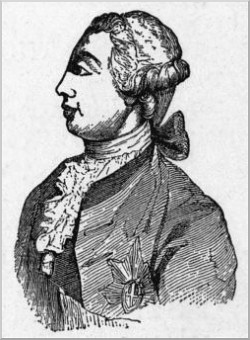 GEORGE III.
GEORGE III.But we have seen how bold and brave a man he was, so the first thing he said to the king was: "I must tell your Maj-es-ty that I love no coun-try but my own"; and said the king: "An hon-est man will nev-er love an-y oth-er." In spite [Pg 19] of this, Ad-ams met with much rude-ness at the Eng-lish court; but he did his best for his coun-try, and when he came home in 1787, af-ter twelve years of hard work, he was met with great joy. He was made Vice-Presi-dent with Wash-ing-ton, and at the end of Wash-ing-ton's term of of-fice he was made Pres-i-dent. He served on-ly four years and then made way for Thom-as Jef-fer-son.
At the age of six-ty-eight years, with the love of the whole land, he went to his home in Quin-cy, Mass. His heart was ever with his coun-try; and he lived un-til his son, John Quin-cy Ad-ams, was made Pres-i-dent of the U-nit-ed States.
His last thoughts were for his coun-try. On June 30th, 1826, he gave as a toast for the great feast to be held on Ju-ly 4th the words: "In-de-pend-ence for-ev-er."
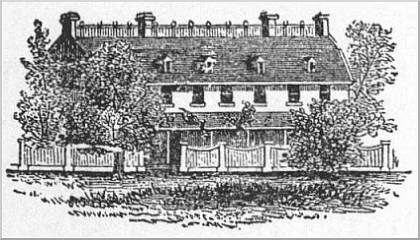 RESIDENCE OF JOHN ADAMS.
RESIDENCE OF JOHN ADAMS.He died on the night of this, A-mer-i-ca's great day. His last words were of Jef-fer-son. He said: "Thom-as Jef-fer-son still lives." But this was not so, for Jef-fer-son had died a few hours be-fore on this same day; and this young land wept for two of her great men, both of whom, in giv-ing up their best to their coun-try, helped to make it the great, free land that it is to-day.
When Thom-as Jef-fer-son was a boy his home was so near the In-di-ans' camp and he saw so much of them that I am sure all boys will like to read of him. His fa-ther, Pe-ter Jef-fer-son, took his bride, Jane Ran-dolph, to a house on a wild tract of land of o-ver 1,000 a-cres, way out in Vir-gin-ia, right in the midst of great woods. He was a big, strong man, and this strength was ve-ry use-ful to him in mak-ing his new home, for he had to chop down huge trees and then cut them up in-to the logs of which the lit-tle log cab-in was built. He took with him in-to this wild new land on-ly a few slaves, but with their help his farm soon grew large, and he be-came a rich man. The In-di-ans were great friends of his, and al-ways sure of a warm wel-come in his home.
Still, the In-di-ans were not al-ways at peace with the white men, who had come to make their homes so near them, and folks had to be on the watch for fear the red men would rob and kill them. Pe-ter Jef-fer-son was made Col-o-nel of the men who kept the In-di-ans back in the woods, and a-way from the lit-tle town that was fast grow-ing up near his home.
Now, this great, strong man was fond of books, and it was with his fa-ther that lit-tle Thom-as be-gan to stu-dy. He was al-so taught to ride, to swim and to shoot; and as he was fond of mu-sic he spent long hours in learn-ing to play on the vi-o-lin, or "fid-dle" as it was then called. The [Pg 21] In-di-ans near his home liked him, and he used to play tunes for the lit-tle, brown In-di-an boys to dance by.
He was on-ly nine years old when he went to board-ing school with a Mr. Doug-lass, and here he be-gan to stu-dy Lat-in, Greek and French. He was so near home that he did not stay a-way long at a time; and in-deed, this home was such a hap-py one, so full of life and fun, that he did not want to be a-way from it long at one time.
But this hap-py time did not last long, for Thom-as was but four-teen years old when his brave fa-ther was shot in a fight with the In-di-ans. This boy was now at the head of as big a place as the fa-ther of George Wash-ing-ton had left to him, and though he kept on with his books he had the care of this great farm to think of and plan for. He was a bright, well-read boy; and was but six-teen when he took a place at Wil-liam and Ma-ry Col-lege. Here, his love for books and mu-sic kept him from the wild life led by some of the young men there, and made friends for him a-mong the great men, whose homes were in Wil-liams-town.
He met a great law-yer, George Wythe, and be-gan the stu-dy of law with him when, at the end of two years, he left col-lege. In five years he be-gan the prac-tise of law in his old home in Vir-gin-ia. In two years, so bright and quick was he, and of such a strong, clear mind, that he had 198 cas-es, held a high place in his State, and was a rich man.
In 1770, while he and his moth-er were a-way from home, the old house burned down. When news of this came to Jef-fer-son, his first thought was for his books, and he said to the slave who had told him: "Did you save an-y of my books?" "No, mas-ter," said the slave, "but we did save your fid-dle." You see e-ven when he was a great and bu-sy [Pg 22] man he still loved his fid-dle; but the loss of all his law books was ve-ry hard for a bu-sy law-yer, and it took him a long while to get the new books that he must have.
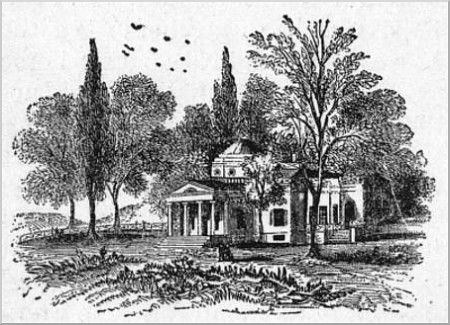 MONTICELLO.
MONTICELLO.He had be-gun to build a ve-ry large new house at Mon-ti-cel-lo, and so in the lit-tle end of this he now went to live. Two years lat-er, to this home, which was to be-come known all o-ver the world, he brought his bride, Mrs. Mar-tha Skel-ton, a young and ve-ry rich wid-ow. They were mar-ried on New Year's Day, 1772, and came to their home in such a hard snow-storm that the hors-es could not drag the coach through the big drifts, so these two young folks left the warm coach, and rode the tired hors-es up to the door of their new home. Jef-fer-son and his wife gave great care to Mon-ti-cel-lo, and it was known far and near for its great beau-ty and for its choice and rare fruits and flow-ers.
But Jef-fer-son was much from home. In 1762 he was sent to Con-gress, and here he at once stood at the head of the band of wise and great men who were then there. His mind was so clear and bright that in all the grave things that came up he knew at once just what to do, he had the trust of all men.
He was a great help in writ-ing the Dec-la-ra-tion of In-de-pend-ence; in fact, it may well be said that he wrote it. Soon [Pg 23] af-ter this great act he left Con-gress and turned his mind to the laws of his own State; he made them safe and just for all men, both rich and poor. In 1779 he was made gov-ern-or of Vir-gin-ia; and now his work was hard; not on-ly must he find a way to keep the In-di-ans from the hous-es of the white men but the Brit-ish came down to the south and laid his fair home in ruins. Not for long years did Mon-ti-cel-lo grow in beau-ty once more. But through all the dark years of war Jef-fer-son did his work well; he forced back the In-di-an foes, and gave help and aid to his State while the War for In-de-pend-ence went on. When the war was at an end, this strong, just man, with his clear, wise brain, was just the one to stand up for our rights in the lands a-cross the sea, so he was sent to France at the time Ad-ams was in Eng-land. While here he had a bill passed by which Eng-land said she would look on our land as free; and this was a big point for us to gain.
When Jef-fer-son came home he was made Sec-re-ta-ry of State, and in this high of-fice did much good work; it was he who first gave us our own coins to use in place of the Eng-lish coins, which, up to that time had been in use here. Now, Al-ex-an-der Ham-il-ton was in charge of the work of mak-ing the coin, and a great feud came up be-tween him and Jef-fer-son as to how this should be done. Men, of course, took sides in this strife, and so two bands sprang up which were known as Re-pub-li-cans and Fed-er-al-ists; to-day these two bands are known as Re-pub-li-cans and Dem-o-crats. Al-ex-an-der Ham-il-ton was killed in a du-el by Aa-ron Burr in Ju-ly, 1804.
In 1801, Jef-fer-son was made Pres-i-dent; and while he was in the chair this land grew strong and great.
Our first steam-boat was built by Rob-ert Ful-ton while Jef-fer-son [Pg 24] was Pres-i-dent; and it did not look at all like the great boats of to-day; it was a heav-y, clum-sy boat, which went by sails as well as steam.
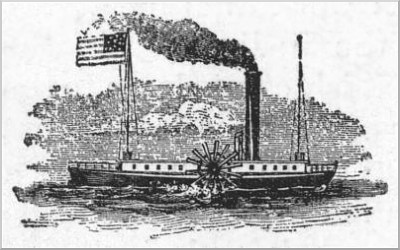 THE CLERMONT.
THE CLERMONT.Jef-fer-son tried hard to put an end to the slave-trade, which he felt was a great wrong; he thought, too, that folks should have the right to serve God in their own way; and he held that on-ly men who could read and write should vote.
He was a great and a wise man; books were his dear friends; and so one of the hard-est things he had to do, af-ter he went home to Mon-ti-cel-lo, when he left the White House, was to sell all his books to Con-gress in or-der to get mon-ey to live on. To his own home hosts of friends and stran-gers came to see the great man, just as they had when he was in Wash-ing-ton. But he sold his books so cheap that the mon-ey did not help him much; and, at last, it seemed as if he must sell his dear old home. But now the peo-ple for whom he had done so much helped him, and a big fund was raised, so that he could keep his home and live there in com-fort un-til his death.
He lived to be a ver-y old man, and e-ven when he was so weak he could not rise from his bed, his great, strong brain was still clear. You know that he died on the 4th of Ju-ly, 1826, just a few hours be-fore the death of his old friend, John Ad-ams.
Next to the name of George Wash-ing-ton, there is no name a-mong the great men of our land, of which the peo-ple are so proud, as that of Thom-as Jef-fer-son.
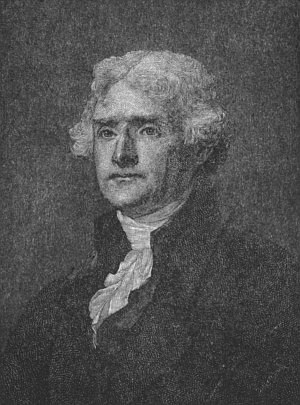 THOMAS JEFFERSON.
THOMAS JEFFERSON.
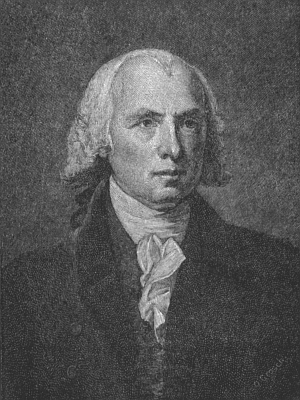 JAMES MADISON.
JAMES MADISON.
In the home of his grand-fath-er at Port Con-way, Vir-gin-i-a, was born, in the spring of 1751, the small boy who was to be our fourth Pres-i-dent. He was ver-y young, though, when he went to live at Mont-pel-ier, his fath-er's great farm in Vir-gin-i-a, and here he led much the same life as George Wash-ing-ton did when a boy. He was but a small boy when the French and Eng-lish War be-gan, and when Brad-dock lost the day, a great fear of the In-di-ans spread to the ver-y door of his home; and he grew up with the name of George Wash-ing-ton ev-er in his ears, as a great he-ro.
His school days were much like those of Jef-fer-son. He was a young boy when he could read French and Span-ish with ease, and was as well hard at work at Greek and Lat-in. In 1769 he went to Prince-ton Col-lege, and here, as well as when he was at home, Jef-fer-son was a great help to him. The old-er man wrote to the boy in the qui-et old col-lege town, a-bout the scenes of war; he told him much of the Brit-ish troops in the Bos-ton streets, of young John Ad-ams and of Wash-ing-ton. So, when in 1771 he left col-lege, he knew a great deal a-bout the strife of the day, and had deep, clear thoughts a-bout it. At home he led a qui-et life with his books, un-til 1774, then he was put at the head of a few men, who were to guard their own town if the Brit-ish troops came there. In this post he showed such a wise, clear mind and did his part so well that in a short time he was put in a high place in his State, and from there in 1779 was [Pg 26] sent to Con-gress. Jef-fer-son was at this time Gov-ern-or of Vir-gin-i-a, and the two men were close, warm friends.
For twen-ty five years Mad-i-son was one of the first men in this land. He had no taste for war, but he soon took a high place with those who made the laws of the land. One of the great things he did was to help draw up the Con-sti-tu-tion of the U-nit-ed States.
In 1794 this grave and qui-et man mar-ried, as Wash-ing-ton and Jef-fer-son had done, a young and love-ly wid-ow. She was but twen-ty-two years old, twen-ty years young-er than he, and her name was Mrs. Dor-o-thy Payne Todd. Lat-er on, the folks who grew to love this fair la-dy so well, gave her the name by which we know her to-day—"Dol-ly Mad-i-son." She was a Quak-er-ess, and so fair and sweet was she, in her qui-et lit-tle gown of gray, that once a friend said to her: "Dol-ly, tru-ly thou must hide thy face, so ma-ny stare at thee."
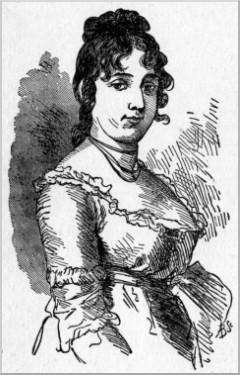 MRS. DOLLY PAYNE MADISON.
MRS. DOLLY PAYNE MADISON.
For one year af-ter his mar-riage, Mad-i-son lived at Mont-pel-ier; then a-gain he went in-to pub-lic life, first in his State, and af-ter that, in 1800, as Sec-re-ta-ry of State un-der Jef-fer-son.
Now, be-gan the gay life at the White House, for which "Dol-ly" Mad-i-son won so much fame. Jef-fer-son's wife was dead, and it was the wife of his friend that helped him en-ter-tain the White House guests. Well did this love-ly la-dy do her part, and in 1808 when, as the wife of the Pres-i-dent, she be-came the real mis-tress of the White House, more than ev-er did the peo-ple love her. To-day, of all the pic-tures of the Pres-i-dents' wives that hang up-on the White House walls, none is more love-ly than that of the gay and pretty "Dol-ly Mad-i-son."
Mad-i-son was most of all a man of peace, and yet it was while he was in of-fice that the U-nit-ed States was drawn in-to the War of 1812. Eng-land, then at war with France, said she had the right to search A-mer-i-can ships to see if they were tak-ing aid to France. A-mer-i-ca would not give this right to Eng-land, and so the war be-gan. In 1814 the Brit-ish came to the cit-y of Wash-ing-ton, and for the on-ly time in A-mer-i-can his-to-ry the Pres-i-dent had to leave his home.
Mad-i-son, with the Sec-re-ta-ry of State and some friends, went to a lit-tle inn near Wash-ing-ton, and here they were met by Mrs. Mad-i-son, who had stayed as long as she could at the White House to save some things from the hands of the Brit-ish. She had brought the great Dec-la-ra-tion of In-de-pend-ence, and had cut from its big frame the pic-ture of Wash-ing-ton and brought it safe-ly a-way. The Brit-ish troops set fire to the White House, the na-vy yard, the Cap-i-tol, and in fact the whole town. They left in great haste, though, when they heard that our troops were on the way, and the next day Mrs. Mad-i-son put on the dress of a wash-wo-man, so folks would not know her, and made a start for her home, but the British had set fire to a bridge she had to cross on the way and then she begged an [Pg 28] A-mer-i-can sol-dier to row her o-ver the riv-er. He would not do so un-til she told him who she was, and then he was ver-y glad to take this brave lit-tle la-dy in his boat. On-ly black ash-es marked the spot on which the White House had once stood, so she had to go to her sis-ter's home, where the Pres-i-dent soon joined her.
The Eng-lish troops now tried to take Bal-ti-more, but our brave men drove them back; and when they tried to make a raid on New Or-le-ans, Gen-er-al Jack-son and his troops fought so hard that the foe could not get in-to the cit-y.
This was the last fight of this war, and peace was signed at Ghent, De-cem-ber 24th, 1814. From that day Eng-land has had to leave our ships a-lone and to treat A-mer-i-ca as one of the great nations of the world.
In 1817 Mad-i-son was not sor-ry to go back to his old home, and here ma-ny hap-py years were spent, for the fair la-dy of the White House kept o-pen house in her own home, and guests from far and near were glad to come here. One of Mad-i-son's dear-est friends was old Thom-as Jef-fer-son, who oft-en rode o-ver from his home at Mon-ti-cel-lo, which was on-ly thir-ty miles from Mont-pel-ier.
Mad-i-son wrote a good deal at this time; and once a-gain was seen in pub-lic life. In 1829 he was at the head of the great change made in all the laws of the whole land.
He died af-ter a long sick-ness at his home in Mont-pel-ier on June 28th, 1836.
James Mon-roe was, like Wash-ing-ton, Mad-i-son and Jef-fer-son, born in Vir-gin-i-a. Our first Pres-i-dent was just twen-ty six years old when, in West-more-land County, on A-pril 28th, 1758, was born the boy who was to be the fifth Pres-i-dent. His fa-ther, Colo-nel Spense Mon-roe, owned a big farm and was quite rich. Lit-tle James was sent to good schools and did not have to work to earn the means to stay in school. He learned at first to hunt, to skate and to swim; and was good friends with all the boys; but through all the fun and school work came up the talk of war; of the long strife with Eng-land and the fierce red men. It was hard for a brave boy to hear such talk and yet keep on at his books, and though Mon-roe did go to Wil-liam and Mary Col-lege, he did not stay long, for we hear of him in 1775 at the camp near Bos-ton. In 1776 we see him at the head of a band of men, and from that time on he was in the thick of the fight. He fought at White Plains and Har-lem Heights, and was so brave that the great Wash-ing-ton gave him high praise for his work, and made him, when but eight-een years old, a cap-tain in the ar-my. At the great fight at Tren-ton he got a bad wound and had to rest for some time. In the big fights of the war this brave young man was one of the first in the field; his hopes were ev-er high, and he put heart in-to the weak and worn men who looked to him for help in the sad years of the war. In 1780 he be-gan the stud-y of law with his old friend Thom-as [Pg 30] Jef-fer-son and soon led the bright men of the day.
So good a friend of his was Jef-fer-son, that the home to which Mon-roe took his bride in 1785, was planned for him by Jef-fer-son, who, so it is said, al-so gave him the nails to build it with.
In 1794 he was sent to France to look out for A-mer-i-ca's rights, but he found talk of war there at that time. The peo-ple did not want a king an-y long-er, but wished to be-come a free land like A-mer-i-ca, with a pres-i-dent at the head; and Mad-i-son, who was a Re-pub-li-can, took sides with the Re-pub-li-cans in France. The king did not like this, and so Mad-i-son had to come home at the end of two years.
But he met with a wel-come at home, and his own State made him its Gov-ern-or. In 1803 he was once more sent to France; this time to buy the State of Lou-is-i-an-a from the French, and he paid Na-po-le-on for this large State $15,000,000.
Twice Mon-roe was sent to Spain and once to Eng-land, where his task was to force Eng-land to stop her search of A-mer-i-can ships. You know he could not do this, for that was the cause of the War of 1812.
Tired and sad at heart, he came back home, and was glad to rest for a while in his own home; but he was of too much use to his coun-try to be i-dle long. Once more, in 1811, he was made Gov-ern-or of Vir-gin-i-a.
Then came the War of 1812; and it was Mon-roe, now Sec-re-ta-ry of State, who, at the head of a few men, saw the Brit-ish land near Wash-ing-ton and sent word to Mad-i-son to leave the cit-y. He al-so act-ed as Sec-re-ta-ry of War at this time, and so well did he do his part that in 1816 he [Pg 31] was named for Pres-i-dent by the Dem-o-crats. He got the most votes and so took the first place in our great land.
His first act was to pay off the great debt which the War of 1812 had brought on us. He did this in a ver-y short time; and now our trade grew so great that rail-roads were built; and so our first rail-road was made while Mad-i-son was Pres-i-dent.
 FIRST RAILROAD TRAIN.
FIRST RAILROAD TRAIN.
There was a fierce war with the In-di-ans in Flor-i-da at this time; but Gen-er-al Jack-son was sent down there and he forced them to lay down their arms and keep the peace.
Just at this time, too, we got Flor-i-da from the King of Spain, and gave up Tex-as, af-ter pay-ing a big sum of mon-ey to the A-mer-i-cans, who had been robbed by Spain.
Mis-sou-ri came in-to the Un-ion while Mon-roe was Pres-i-dent, and there was a fierce storm of words; the North said she should not hold slaves after she was a State, the South said that she should.
At last Con-gress gave way to the South-ern States; but made a law that there should be a line drawn through the land, north of which no State should hold slaves.
In 1825 Mon-roe was free to go to his home at Oak Hill, Vir-gin-i-a, and here he lived un-til 1830. His wife died in that [Pg 32] year, and then he went to live with his daugh-ter in New York. He died here on the 4th of Ju-ly, 1831, and his name is one that the whole land loves and hon-ors.
He was bur-ied in New York, but on the one hun-dredth an-ni-ver-sa-ry of his birth, his bod-y was tak-en to Rich-mond, Vir-gin-i-a, and a hand-some stone raised o-ver his grave.
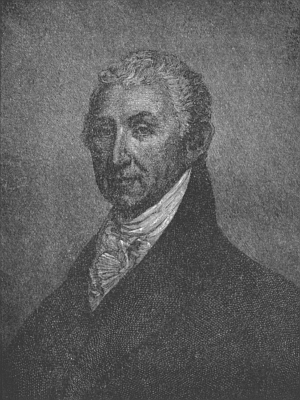 JAMES MONROE.
JAMES MONROE.
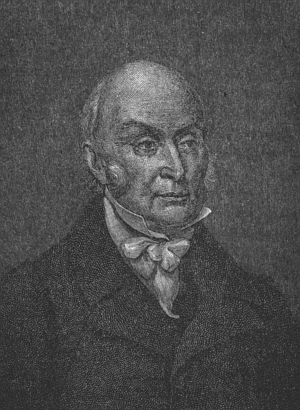 JOHN QUINCY ADAMS.
JOHN QUINCY ADAMS.
The lit-tle boy who be-came our sixth Pres-i-dent led a life not at all like that of an-y oth-er of the boys of whom you have read. His fa-ther was John Ad-ams, our sec-ond Pres-i-dent, and when, on Ju-ly 11th, 1767, lit-tle John Quin-cy Ad-ams was born in the old home at Brain-tree, Mass., his great fa-ther was al-read-y speak-ing brave-ly for his coun-try's rights in the cit-y of Bos-ton. In 1772 the fam-i-ly moved to Bos-ton, and lit-tle John, for two years, saw, as the oth-er boys did, the Brit-ish sol-diers in their bright red coats on pa-rade in the Bos-ton streets, and heard on all sides talk of war with Eng-land. He saw a lit-tle of real war, too; for when he was eight years old, his moth-er took him on top of a high hill, called Be-mis Hill, from which he saw the smoke and heard the roar of can-non in that aw-ful bat-tle of Bunk-er Hill. When, in 1776, the Brit-ish left Bos-ton, this lit-tle lad of nine years used to oft-en ride on horse-back in and out of the city to bring home the lat-est news. This was a ride of twen-ty-two miles from the old home at Brain-tree, where Mrs. Ad-ams had gone when her hus-band went to Con-gress, and I think it took a pret-ty brave and strong boy to ride all those long miles a-lone.
When John Ad-ams went to France to try and get her aid for A-mer-i-ca, he took with him his lit-tle boy, then ten years old. It was a rough, hard trip; for, not on-ly were there fierce winds which lashed the waves in-to fu-ry, but they were chased by Brit-ish ships, for Eng-land did not want John [Pg 34] Ad-ams to get this help from France. But they reached Par-is in safe-ty, and lit-tle John was at once put in a French school. He on-ly stayed for a-bout a year and went back home with his fa-ther in the spring. Now for three months he was with his moth-er, and then in No-vem-ber he and some oth-er boys who were placed in his fa-ther's care, all start-ed for France, where they were to be put in a good school.
This trip was hard-er than the oth-er one, for the big ship, "Sen-si-ble," sprang a leak, and af-ter some days of great per-il, they were glad to go to the near-est land, which was Spain; and now there was a long, hard trip by land be-fore France could be reached. They had sailed on Nov. 13th, 1779, and it was not un-til Feb. 5th, 1780, that the lit-tle par-ty reached Par-is.
For two years now our lit-tle lad was hard at work with his books in Par-is; then his fa-ther was sent to the Neth-er-lands as A-mer-i-can Min-is-ter, and he took his lit-tle son there and placed him in a school in Am-ster-dam; from here he went to the U-ni-ver-si-ty at Ley-den, where he stayed un-til Ju-ly, 1781.
He was now on-ly four-teen years old; but you see he had been in so ma-ny lands, that he could speak as the folks did in those strange lands, and this was a rare thing in those days. In 1781 Fran-cis Da-na, then the A-mer-i-can Min-is-ter to Rus-sia, need-ing some one to help him in his work, sent to Ley-den for this young boy. They passed through Ger-ma-ny on the way to Rus-sia, and here John Quin-cy learned some-thing of an-oth-er new land. Then, af-ter a year in Rus-sia, he left Mr. Da-na and stud-ied for a year in Swe-den. The next spring he went to his fa-ther in Hol-land, and then went to Par-is with him, and was pres-ent [Pg 35] when the trea-ty of peace be-tween Eng-land and A-mer-i-ca end-ed the War of In-de-pend-ence.
For two years more he stud-ied a-broad, and then sailed for home in May, 1783. He at once en-tered the jun-ior class at Har-vard Col-lege and grad-u-a-ted with next to the high-est hon-ors in 1787. Then he took up law, as his fa-ther had done, and be-gan to prac-tise in Bos-ton. He made few friends; folks did not love him as they had ei-ther Mad-i-son or Mon-roe, but he was al-ways known to be a man of great pow-er, and of great learn-ing; and know-ing so much of other lands, he was just the man to be sent as A-mer-i-can Min-is-ter to these coun-tries.
In 1794 Wash-ing-ton sent him to Hol-land, and in 1796 he was sent to Ber-lin.
When, in 1801, Ad-ams came back home, it was to find new hon-ors wait-ing for him. He was sent first to the State Sen-ate and then to Con-gress. You see the steps by which our Pres-i-dents rose to pow-er were much the same in ev-er-y case. A du-ty well done in a small place led to some-thing a lit-tle high-er, and so on to the great-est hon-or of all—the Pres-i-dent's chair.
The State of Mas-sa-chu-setts was ver-y proud of John Quin-cy A-dams; not only was he a great states-man and the son of the man whom they all loved, but he was, as well, a fine schol-ar, and a bril-liant speak-er. In 1809 he was sent a-broad a-gain for his coun-try; this time to Rus-sia, where he had not been since he was a boy of four-teen; in 1815 he was sent to France, but he was here on-ly a few months, when war broke out in France, and all the min-is-ters from oth-er coun-tries were called a-way; he went at once to Eng-land, and here he had a much more pleasant time than his father had when he went there as the first Amer-i-can [Pg 36] min-is-ter; the U-nit-ed States was now known as a big strong coun-try, and no one dared to be rude to her min-is-ter. In 1817 his own land felt the need of the great man who had served her so well a-broad, and he was called home to be-come Sec-re-ta-ry of State. No man was so well fit-ted for this post as he; for there were ma-ny men from the lands a-cross the sea, now com-ing and go-ing in the cap-i-tal of the U-nit-ed States, to talk o-ver great ques-tions; there were new states com-ing in-to the Un-i-on; and oth-er lands were al-ways try-ing to gain a lit-tle pow-er here; so John Quin-cy Ad-ams, who not on-ly was a great schol-ar, and a fine law-yer, but al-so knew well so ma-ny lands be-sides his own, was just the man to help Pres-i-dent Mon-roe through his eight years of work.
He al-so was the man best suit-ed for the Pres-i-dent's chair, at the end of Mon-roe's term of of-fice. Not once, while Ad-ams was in Wash-ing-ton work-ing hard, did he for-get his old fa-ther, watch-ing, in his home at Quin-cy, the bu-sy life of his great son. Once ev-er-y year he went to the qui-et old home, and told his fa-ther of the life in Wash-ing-ton, in which the old-er man had once held so great a place.
At the age of six-ty-eight, Ad-ams went back to his home in Quin-cy, but in 1830 once more he was sent to Con-gress, and for six-teen years he kept his seat there; he grew old and gray serv-ing his na-tive land; he made bit-ter en-e-mies, but ma-ny warm friends; he feared no one, and his voice was al-ways for the free-dom of this great land. On No-vem-ber 19th, 1846, he had a stroke of par-al-y-sis while walk-ing in Bos-ton; but three months later we saw him a-gain in Wash-ing-ton, and tak-ing his old seat in Con-gress. As the gray old man came feeb-ly in-to the hall, ev-er-y man pres-ent [Pg 37] rose to his feet, and so stood un-til he took his seat. He was too weak now to talk, and on-ly once more did he try to speak his mind on one of the great ques-tions of the day. This was on Feb-ru-a-ry 21st, 1848. He rose to speak, but fell in-to the arms of a man near him; at once they took him in-to a cloak-room, and sent for his wife. For two days did he lay there, and then, on the morn-ing of Feb-ru-a-ry 23d, his great soul took its flight. His last words were: "This is the last of life, and I am con-tent."
The boy who was to be our sev-enth Pres-i-dent did not lead the sort of life, as boy or man, that the oth-er Pres-i-dents did. He was the son of a poor I-rish-man who came here from Ire-land in 1765. He was born on March 15th, 1767, in a small place in South Car-o-li-na, called the Wax-haw Set-tle-ments. Poor and mean was the log house in which he first saw the light, and when his fa-ther died, which was when An-drew was a wee baby, the life of the lit-tle home was hard-er yet. His moth-er was a brave, good wo-man, and so well did she do her hard part in life that she was loved by all who knew her, and was known far and near as "Aunt Bet-ty."
Andrew was a great care to her when a boy, for, full of life and fun, he did not care for books, and was at the head in all sorts of wild sport. He was ev-er read-y for a fight with boys who made him an-gry; the small boys looked to him for help in any strife with boys big-ger than they; and so strong was he, or read-y to knock a boy down for a real or a fan-cied wrong, that they soon found it best to give him his own way, and let him take his place as lead-er a-mong them; when he was at the head all went well.
He was just nine years old when the Dec-la-ra-tion of In-de-pend-ence was signed, and then came four years of war with Eng-land. In 1780 this war was car-ried into the South, and on May 29th a number of Brit-ish sol-diers un-der Colo-nel Tarle-ton killed and wounded over 200 of the men and boys from the Wax-haw set-tle-ments. A-mong those who helped [Pg 39] to care for the hurt and dy-ing men were Mrs. Jack-son and her boys. An-drew was on-ly four-teen when he fell in-to the hands of the Brit-ish, and he, with o-ver one hun-dred sick and dy-ing men, was kept for days in a dir-ty pen, with no beds, lit-tle to eat and on-ly stale wa-ter to drink. To make things worse, small-pox broke out and An-drew was one of those who had it. His brave moth-er was at last a-ble to free him, and it was ow-ing to her lov-ing care that he did not die at this aw-ful time.
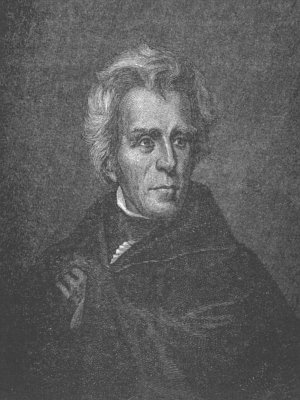 ANDREW JACKSON.
ANDREW JACKSON.
Af-ter he was well e-nough to be left, his moth-er, who was ver-y sor-ry for the poor A-mer-ican sol-diers, went to Charles-ton to take care of those who were sick and wound-ed here. Just as she had be-gun her no-ble work she was ta-ken sick and died.
Soon af-ter her death came the good news of peace; and now young An-drew be-gan to pay some heed to his books, with the hope of stud-y-ing law. He al-so taught school for a while, though he could not have been a ver-y good teach-er, for he nev-er learned how to spell ver-y well him-self. Still, in 1787, we find he has learned e-nough to take up the prac-tice of law, and he be-gan this work in Nash-ville, Ten-nes-see; and now we see the boy who had been the lead-er in boy-ish sports, games and fights, be-come at once a lead-er a-mong men. He was tall and quite good look-ing, with bright blue eyes and red-dish hair, and he was full of fun and life; he rode horse-back well, and knew how to shoot straight; and a-bove all he was a brave man, a-fraid of noth-ing.
In 1788 he was giv-en a place in which he had to try for the State all men who had done wrong and it need-ed, in those wild days and in that new land, a brave man for such a work, for he would make ma-ny foes, both a-mong the [Pg 40] bad white men and the In-di-ans. His work took him from Nash-ville to Jones-bor-ough, and here the In-di-ans were ver-y strong and ver-y cru-el, kill-ing and rob-bing the white men and wo-men, and e-ven the lit-tle ba-bies in their moth-ers' arms. Hear-ing and see-ing day by day more and more of this sav-age war-fare, al-ways in dan-ger of be-ing killed by night or day by some In-di-an hid-ing be-hind a tree or house, Jack-son learned to know the In-di-ans and their hab-its bet-ter than most men did, so was read-y to fight them in their own way in a few years.
He made his home in Nash-ville and built up a good law prac-tice. He grew in pow-er so fast that in 1797 he was sent as the first man from Ten-nes-see to Con-gress. He went all the way from his home to Phil-a-del-phi-a, a dis-tance of 800 miles, on horse-back. In 1798 we see him a-gain at home as Judge of the Su-preme Court, and here he stayed un-til 1804. Then came four-teen years of peace for the land, and a hap-py home life for him. A-mong oth-er things which Jack-son did at this time was to build a large log store in which he kept all sorts of things which both the white men and the In-di-ans want-ed. His home, which was called "The Her-mit-age," was a fine house for those days, and in later years it grew as well known as Mt. Ver-non and Mon-ti-cel-lo. Jack-son was all through his life a man who would stand up for his own way, if it led to strife with his best friend, and more than once he fought du-els to the death. In Con-gress he would, when he rose to speak, some-times choke with blind rage if he could not make his point and force men to yield to him.
Af-ter years of peace came the War of 1812, and from that hour Jack-son's name was first in the minds of men. He showed great skill in his fights with the red men, and won [Pg 41] much fame in a fierce fight with the Creeks, a bad tribe of In-di-ans in Al-a-ba-ma.
He could force men to do as he said; the young men of that day looked up-on him with awe and fear, but rushed to fill his ranks and serve un-der him.
In 1815 he won the day at New Or-le-ans, and put the Brit-ish troops to flight with great loss of life. At the end of the war, back home went Jack-son for the rest of which he stood in sore need; but, in 1818, strife with the Sem-i-nole In-di-ans in Flor-i-da came up, and Jack-son was sent there.
At this time Spain owned Flor-i-da, and it was both Span-ish troops and In-di-an foes that Jack-son had to meet, but he won his way, and at last made Spain yield her rights in Flor-i-da and sign a peace. In 1823 she sold Flor-i-da to us for $5,000,000; not such a great sum when we think what a rich and great place this "Land of Flow-ers" is. Jack-son was now put at the head of things in Flor-i-da, and the hard-est part of his work was to keep peace in the bad tribe of Sem-i-nole In-di-ans. With their chief Os-ce-o-la at their head they would creep out from the woods and swamps of Flor-i-da, rush on the homes of the white men, and burn them to the ground, and then dash back to the woods, where they could safe-ly hide. At the end of four years Jack-son was glad to go home to the Her-mit-age; here he and his wife led a qui-et life and kept up ma-ny of the ways of their young days, though now they were quite rich. Af-ter din-ner, they would sit, one on each side of the great big wood fire, in the large hall, and smoke their old pipes, with the long stems, just as they had in their log cab-in of long a-go. But the great gen-er-al could not live this qui-et life long; in 1823 he was sent to Con-gress; and here [Pg 42] he met with high hon-or. On New Year's Day, 1824, the great men of the day gave him the pock-et tel-e-scope that Wash-ing-ton had owned; a year from the day on which the Bat-tle of New Or-le-ans was fought, John Quin-cy Ad-ams gave him a great feast, at which were men, who held high rank here and in oth-er lands; and on the day that he was fif-ty-sev-en years old, Pres-i-dent Mon-roe gave him a gold badge for his brave acts in his fights for his coun-try. In 1828 this rough, but brave and kind, old man, was made pres-i-dent; and now he stood up for his own way, just as he had in the wars of his land, and when he was but a boy. His first act was to stop some states in the South from leav-ing the Un-ion. John C. Cal-houn was at the head of a band of men, who felt that the North had more rights than the South; had more than its share of wealth and land; so rose the wish to set up a rule just for the South. "But," said Jack-son, "if one state goes out oth-ers will; and our great land will be a ru-in." So he stopped this plan, just in time.
All the years that Jack-son was pres-i-dent, our great land gained in strength; new rail-roads were built; and new steam-boats; the land grew rich year by year.
In 1824 the slaves in Mex-i-co were set free, and Tex-as came in-to the Un-ion.
On the whole, Jack-son's term was a good one for the land; and so well did the peo-ple like him, that he is the on-ly pres-i-dent of whom it has been said that he was bet-ter liked when he went out of of-fice than when he went in.
The last years of his life were spent at "The Her-mit-age," where he died on June 8th, 1845.
The place in which Mar-tin Van Bu-ren was born was far from the homes of the oth-er boys who be-came our pres-i-dents; and his life, as a boy, was not one bit like theirs. His fa-ther and moth-er were Dutch; Hoes was his moth-er's queer name; and the name of the small town, in which, on De-cem-ber 5th, 1782, he was born, was Dutch too—Kin-der-hook; the lit-tle town was on the Hud-son Riv-er, way up in New York state. His fa-ther kept a good inn, and had a small farm; so he could send Mar-tin to good schools; Mar-tin was so quick and bright at his books that he took up the study of law when he was four-teen; and at twen-ty-one he was a law-yer and at work in Kin-der-hook. He was a man who made friends with great ease; and as he was a good law-yer as well, his state soon saw that he was the man to speak for it at Wash-ing-ton. So in 1821 he was sent to Con-gress; then in 1828 he was made gov-ern-or of New York state; and this was a big step toward the pres-i-dent's chair; he was sec-re-tary of state when Jack-son was pres-i-dent; and in 1837 he took the oath of of-fice, and be-came pres-i-dent.
He was in of-fice on-ly one term; and those four years were hard ones for him.
Just at this time the men in Can-a-da tried to be free from Eng-land, and have home-rule; and some of our men took sides with them; this made Eng-land an-gry of course; and if Van Bu-ren had not put a stop to such things, we should [Pg 44] have had war once more; but he said all who tried to give aid to Can-a-da should be sent to jail; and so the fear of war was put down.
At the end of Van Bu-ren's first term some want-ed him to take the chair a-gain; but more want-ed Gen-er-al Har-ri-son, who had made a great name in the In-di-an wars. Van Bu-ren was rich, and Har-ri-son was poor; and this race for the pres-i-dent's chair was called the "Log Cab-in a-gainst the White House." Af-ter Har-ri-son took the chair, Van Bu-ren went back to his home at Kin-der-hook, where he lived in qui-et, until, in 1848, he was once more put up for pres-i-dent; but James K. Polk had more votes than he, and so won the e-lec-tion.
In 1853 Van Bu-ren and his son went to Eu-rope, where they stayed two years. He spent the rest of his life at his old home, where he died on Ju-ly 24th, 1862.
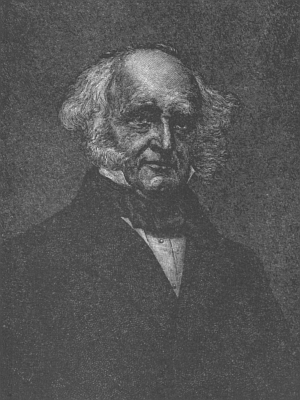 MARTIN VAN BUREN.
MARTIN VAN BUREN.
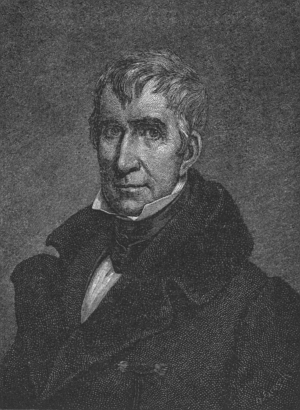 WILLIAM H. HARRISON.
WILLIAM H. HARRISON.
Wil-liam Hen-ry Har-ri-son was born in Berke-ly, Vir-gin-i-a, on Feb-ru-a-ry 9th, 1773; his fath-er, Ben-ja-min Har-ri-son, was not a rich man, but lived at ease on a small farm; he was a man of much force in his state, and was at one time its gov-ern-or. He was a brave, strong man, and taught his small son to be like him; now while lit-tle Wil-liam was hard at work at school, he heard much talk of the In-di-an wars; and his heart was full of long-ing to fight these cru-el foes of the white men.
So, though he went to Hamp-den Syd-ney Col-lege, he did not stay long, but left to join the ar-my. He was such a brave fight-er that, when he was twen-ty-one, Wash-ing-ton put him in charge of the troops at Fort Wash-ing-ton, just the place where the In-di-ans were strong-est and most cru-el.
Ma-jor Gen-er-al Wayne was at the head of the ar-my, and so rash and fear-less was he, that his troops called him "Mad An-tho-ny." He knew well how to fight the red men though, and in 1794 beat them in a fierce fight, on the spot where the cit-y of De-troit now stands. So brave was young Har-ri-son at this time, that he was made a cap-tain; for six years Har-ri-son was in the heat of the In-di-an wars; and learned all the sav-age ways of war; then he went home to rest, but was soon sent to Congress. So well did he do his work here, that In-di-an-a now chose him for gov-ern-or; and here he was so much liked that he kept his seat [Pg 46] three terms; the hard-est task that he had to do while gov-ern-or was to keep peace with the In-di-ans; and side by side with his name, stands that of a great and good In-di-an chief Te-cum-seh; for years these two men tried to help the In-di-ans and teach them to live in peace; but at last the hate of the red men for the whites who were forc-ing them from their lands, end-ed in a great fight at Tip-pe-ca-noe, where the In-di-ans lost the bat-tle. So brave had Har-ri-son been in this fight, that he was made a gen-er-al; and in the War of 1812 was put at the head of the ar-my. At the close of the war, the brave old In-di-an fight-er went to live on his farm at South Bend, In-di-an-a, in the then state of O-hi-o; but he was too great a man to live a qui-et life, and was sent to Con-gress twice and once a-broad in his coun-try's serv-ice. Then in 1836, he ran for Pres-i-dent, but did not get the most votes; four years la-ter he was put up once more, and he and John Ty-ler won by a big vote. It was in this race for Pres-i-dent, that the song was sung, whose cho-rus you hear to-day: "Tip-pe-ca-noe and Ty-ler, too."
On the 4th of March, 1841, Wil-liam Hen-ry Har-ri-son, the old In-di-an fight-er, now six-ty-eight years old, came from years of qui-et home life, to take up the cares and wor-ries of a pres-i-dent's life, but the task was too much for him, and a month af-ter-ward, on A-pril 4th, 1841, the brave old man died.
As a boy, the life of John Ty-ler was much the same as that of the boys of to-day. He was born on March 29th, 1790, in Charles Cit-y, Vir-gin-i-a, at a time when the whole land was at peace. No talk of the red men came to his young ears; and no fear fell like a dark cloud over the fun and play of his boy-hood. He was the son of a man who had for friends the great men of his day;—Wash-ing-ton and Ben-ja-min Har-ri-son were warm, close friends of old John Ty-ler; and he was at one time Gov-ern-or of Vir-gin-i-a. Young John was sent to school when he was a ver-y small boy; and, though he was fond of sports and games, he kept hard at work at his books and won a high place at school. He was a mere boy when he could en-ter Wil-liam and Ma-ry Col-lege; and he left in 1806 at the head of his class. He at once took up law with his fa-ther, and soon showed the good stuff of which he was made. Clear and quick was his mind, swift to think and feel; and his words came as fast as his thoughts. He rose with great, quick strides towards the first place in the land. In 1825 he was made Gov-ern-or of Vir-gin-i-a; and in 1827, was sent to Con-gress, where he kept his seat for six years; these were years of strife as to the slave trade, and there were fierce, hard words and harsh thoughts be-tween the men of the North and those of the South. Ty-ler was at home for a few years af-ter he left Con-gress, and took a high place as a law-yer. In 1836 he was put up with Har-ri-son in the race for the pres-i-dent's [Pg 48] chair. But it was not till 1840 that he won this place; then, as the vice-pres-i-dent had not a great deal to do, Ty-ler went home to Wil-liams-burg. It was here that the sad news of Har-ri-son's death was brought to him, and he at once went on to Wash-ing-ton. Here he found he had a hard task; for he and his Con-gress did not think the same on the great ques-tions of the day and were ev-er at strife. One of his first acts was to put down a state war in Mis-sou-ri. A Mor-mon, by the name of Smith, and a band of men who thought as he did went down there to live; folks there did not like this and tried to drive them out of the state, but this was a hard thing to do, for there were a-bout 12,000 Mor-mons. At last, Ty-ler sent troops there to put down the strife, and the Mor-mons were sent to Il-li-nois. They were here but a short time when the same old strife a-rose, and then they fled to the lands in the far west—where they are to-day, in the state of Utah. War broke out in Tex-as while Ty-ler was in the chair, and af-ter fierce fights be-tween the Tex-ans and Mex-i-cans the Tex-ans won, and were at the head of the state. They asked at once to come in-to the Un-ion, and in 1845 this great state came in. In the last year of Ty-ler's rule Sam-u-el F. B. Morse found out how to send words in just a flash of time through miles and miles of space; and you chil-dren know well that the fine wire stretched from one great pole to the next on which the quick news was sent was called the "tel-e-graph."
At the end of Ty-ler's first term, James Knox Polk had the most votes, and so took the pres-i-dent's chair; and this news was the first that was sent o-ver the tel-e-graph wires.
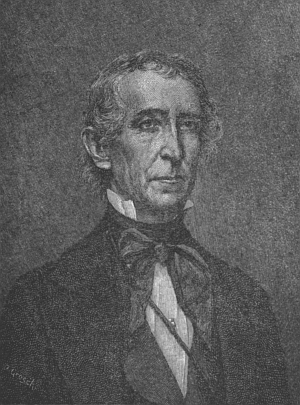 JOHN TYLER.
JOHN TYLER.
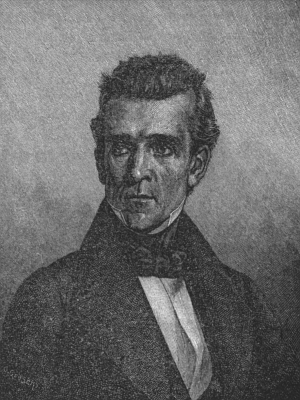 JAMES K. POLK.
JAMES K. POLK.
As a boy James Knox Polk led a life that would please a good ma-ny of the boys of to-day. He was born in Meck-len-burg County, North Car-o-li-na, on No-vem-ber 2d, 1705; but in 1806 his fa-ther went to Duck Farm, Ten-nes-see, and lit-tle James, e-lev-en years old, was of much help in the new home. Where the day's work took the big, strong fa-ther, there went the small son; if there was a long ride to get food or clothes from some big town, lit-tle James could help care for the hors-es and when his fa-ther and oth-er men, for weeks at a time, were in the great, wild woods, hunt-ing, mak-ing new roads, or helping each oth-er build the log cab-ins, which were the homes of these ear-ly set-tlers, James would be there too, cook-ing meals and keep-ing the camp neat and bright for the men who came back tired and hun-gry at night.
So years passed by with much work in the o-pen air and lit-tle of stud-y or books; but when James was four-teen years old it was time that he should earn mon-ey.
He was not a big, strong boy; he could not stand rough, hard work on a farm; he did not love to hunt; he had no taste for war; so he was put in a small store, that he might learn to man-age a big store when he grew old.
Here he first saw some books, and his love for them a-woke; for weeks and months he worked a-lone with an-y book or pa-per he could find.
At last his fa-ther took him from the store and sent him [Pg 50] to school; he was now eight-een, but he was so quick to learn, so bright and smart, that five years from this time he left the U-ni-ver-si-ty of North Car-o-li-na at the head of his class.
When he came back to Duck Riv-er, not on-ly was his fa-ther proud of his boy, but all Ten-nes-see knew that he was one of the bright-est young men in the state.
Now, just at this time, Gen-er-al Jack-son was fight-ing so brave-ly a-gainst the In-di-ans and all the boys of Ten-nes-see were as proud of this great he-ro as the boys of Vir-gin-i-a had been of Wash-ing-ton. In 1819, when young James Polk went to Nash-ville, Ten-nes-see, to take up law, he was near Jack-son's home; and he and the great Gen-er-al be-came fast friends. It was ow-ing to Jack-son's help that, in 1824, Polk, then a bright young law-yer, took his first pub-lic step and was sent to the state leg-is-la-ture.
He a-rose so fast in the love and trust of his state that he was sent to Con-gress when on-ly thir-ty years old; and here he stayed for thir-teen years.
In 1840 he went back to his home at Grun-dy's Hill in Nash-ville, hav-ing made a great name in Wash-ing-ton; not once did he lose his hold on the great ques-tions of the day, e-ven while here at home; and in 1845 he was chos-en pres-i-dent of the U-nit-ed States.
While he was in of-fice, once more the U-nit-ed States was at war, and this war is known as the "Mex-i-can War." Its cause was this:—
Our peo-ple in Mex-i-co said that a big tract of land down there was theirs; the Mex-i-cans laid claim to it too; so Gen-er-al Tay-lor went down to see that our rights were looked af-ter.
In the first fight he won, and lost but nine men; then he [Pg 51] laid siege to their great cit-y of Mon-te-rey, and af-ter a hard fight took the town.
That same year Gen-er-al Scott took the cit-y of Ve-ra Cruz; on Sep-tem-ber 14th, 1847, the A-mer-i-can troops took the cit-y of Mex-i-co, and the long war was at an end.
In 1848 came the news of great gold mines in Cal-i-for-ni-a; and men went in such num-bers to this state that the "Gold Fe-ver of 1849" is a well known term to-day.
While Polk was in the chair, three new states came in; and two of them were free states; that is, no slaves could be kept there; just at this time some men formed a band, and said that no slaves should be kept in an-y new state which the U-nit-ed States should gain.
In 1849 Polk went home to Nash-ville, Ten-nes-see; he was on-ly fif-ty-eight years old; but was so worn out with years of work that he lived but a few months af-ter he got home; he died on the 15th of June, in the same year.
Zach-a-ry Tay-lor was born in Vir-gin-i-a, on No-vem-ber 24th, 1784; but when he was a small boy his fa-ther went to live in Ken-tuck-y; and long af-ter the rest of the land was at peace this state was the scene of such fierce fights with the In-di-ans that it was known as "The dark and blood-y ground." It is not strange that this boy, who lived at a time when wo-men as well as men had to know how to load and fire guns, so that they could help to keep the red men from their homes, should have grown up to be a brave, strong man.
As a boy he went to good schools, but cared far more for the tales of war which his brave fa-ther told him than he did for his books; he did love books which told of great fights and brave men, and read all that he could get. When he was just of age he went to war, in place of a friend, and was so brave and fear-less that he soon took a high place.
He was in the great fight of Tip-pe-ca-noe; and all through the War of 1812 he showed great skill in his fights with the red men;—well he knew all their tricks and modes of war. He gained great fame in Flor-i-da, when he was sent there to make the Sem-i-nole In-di-ans keep the peace. For years had this tribe of In-di-ans made war on the white men; their chief, Os-ce-o-la, had, years a-go, gone to one of the forts with his wife, who was a slave girl; he had been put in chains, and she held at the fort. In his rage, he had sworn to lead his men in war, when he could get to them; at last his chance had come, and he had fled by night from the [Pg 53] fort. To rouse his tribe and hurl them at the whites, was his first thought; and long and cru-el were the fights that went on for years. At last Tay-lor was sent to Flor-i-da; and now a trick was played on this great chief of the In-di-ans; with a flag of truce, he came to the fort to talk with the gen-er-al; and by the or-ders of the gen-er-al, he was held there a pris-on-er; he was sent, at last, to Fort Moul-trie in Charles-ton har-bor, and there, in the year 1838, he died. With their chief dead, the Sem-i-nole In-di-ans had no heart for war; and soon the few red men left of this great, fierce tribe were put far a-way from each oth-er, in new states, and there was peace in Flor-i-da.
Gen-er-al Tay-lor won great fame in the Mex-i-can War; in 1847 he won the fight of Bu-e-na Vis-ta, which took place on Wash-ing-ton's birth-day; and he won too the fights of Pa-lo Al-to and Mon-te-rey. On Sep-tem-ber 24th, 1847, our troops took the cit-y of Mex-i-co, and the war was brought to an end. As Tay-lor went home to Ba-ton Rouge, he met with praise, at each place he passed; folks came in crowds to see the great he-ro; cheers filled the air; flags were raised and guns were fired; he was the i-dol of the land. His men too were fond of him, for all through the war he had been kind and good to them, and shared their hard life. He was such a he-ro to the whole land, that it is not strange that he was named for the next pres-i-dent, and got the most votes. He took the chair of state in 1849, but the brave old man came in just at the time when the strife a-bout slaves was at its height; and the cares of the of-fice were too much for him, as they had been for Har-ri-son. On Ju-ly 4th, 1850, there was a great time in Wash-ing-ton, in which he took part; but his health was too weak to stand this strain; and in the midst of his work, on Ju-ly 9th, 1850, the brave old In-di-an fight-er died.
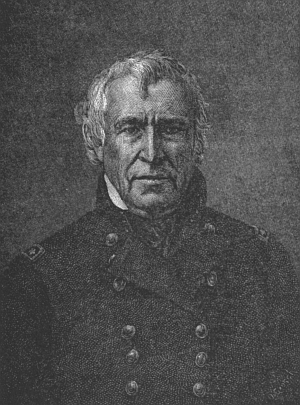 ZACHARY TAYLOR.
ZACHARY TAYLOR.
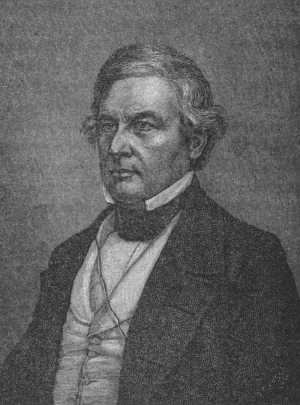 MILLARD FILLMORE.
MILLARD FILLMORE.
In a log ca-bin way out in the western part of New York State, deep in the dense, wild woods, was born, on Jan-u-a-ry 7th, 1800, the boy who was to be the thir-teenth pres-i-dent of the U-nit-ed States. His fa-ther had gone there from Ver-mont, to get a-way from the In-di-ans, who gave no peace in his old home; and no house stood near-er than four miles to the lit-tle home he had built in the wild new land; there was no school; and if there had been lit-tle Mil-lard had not much time to go; for he was ver-y young, when he was taught to earn mon-ey and help in the lit-tle home. He learned how to make cloth from the soft white wool; and was hard at work, in this way, till he was nine-teen years old; then a love of books came to him; and a law-yer took note of him and gave him such aid that he soon took a high place in the law-stud-ies. When he was twen-ty-two, he went to Buf-fa-lo, and taught school, to help pay his way, as he went on with the stud-y of law. He was bright and quick, and, in 1823, he be-gan to prac-tise law and soon rose to such a high place in the state bar that his state sent him to Con-gress. Here his work was done so well that he was made vice-pres-i-dent, when Tay-lor took the pres-i-dent's seat; and on his death be-came pres-i-dent.
While he was in the chair one of his aids was the great Dan-iel Web-ster, who looked af-ter the laws of all the states. He had been in of-fice but a short time, when a band [Pg 55] of men tried to get Cu-ba from Spain; but they were soon put down. He was in of-fice one term, and then went home to Buf-fa-lo, and took up the prac-tice of law a-gain. In 1855 he went to Eu-rope, where he stayed for one year; he then came home to lead a qui-et life, full of stud-y, till his death on March 8th, 1874.
A brave sol-dier in the War of the Rev-o-lu-tion was Ben-ja-min Pierce, the fa-ther of the boy who was to be our four-teenth pres-i-dent; and it was in the old town of Hills-bor-ough, New Hamp-shire, that, on No-vem-ber 22d, 1804, Frank-lin Pierce was born. The fa-ther was a big strong man, fond of sports and fun of all kinds and much liked by all; he was the chief man in Hills-bor-ough, and was at one time gov-ern-or of his state. In such a home it is not hard to see that the life of lit-tle Frank-lin would be full of work and play as well. He was sent to good schools, and was just six-teen when he went to Bow-do-in Col-lege. He was full of fun, and at once took the lead in the col-lege life; but he worked hard at his books too; in 1824 he left col-lege, and took up the stud-y of law, and soon be-came one of the bar. He was now at his old home in Hills-bor-ough, and folks felt that he was a man of brains and great force; he was sent to Con-gress, and held high of-fice in his state while he was still a young man; and in the Mex-i-can War he showed him-self as brave a man as his fa-ther had been. At last, in 1853, he was made pres-i-dent. At this time, the strife as to the slave trade was at its height; some states wished to have slaves, while some held it wrong. At last Con-gress made a law that all new states should do as they pleased. The first "World's Fair" was held [Pg 57] in New York, just at this time, in a great hall made of glass, which was known as "The Crys-tal Pal-ace."
Pierce was in of-fice one term; at the end of that time he went back home to Con-cord, Mas-sa-chu-setts, where he lived a qui-et life un-til his death, on Oc-to-ber 8th, 1867.
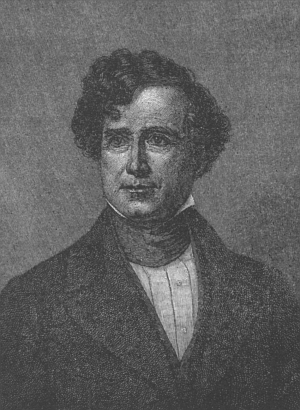 FRANKLIN PIERCE.
FRANKLIN PIERCE.
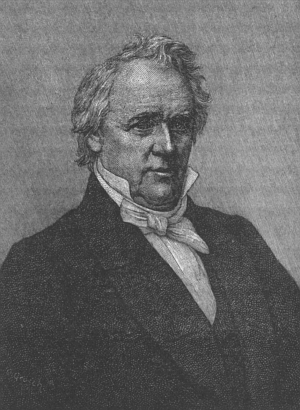 JAMES BUCHANAN.
JAMES BUCHANAN.
A strong, brave, young man from Ire-land was the fa-ther of our fif-teenth pres-i-dent. He had come here in 1783, and bought a small farm in Penn-syl-va-ni-a; so well did he do that he soon bought a store as well; and when, on A-pril 23d, 1791, at Cove Gap, lit-tle James was born, his fa-ther was quite a rich man. He sent his son to the best schools and he was just six-teen years old when he went to Dick-in-son col-lege. Here he took first place with ease. In 1809, when he left col-lege, he be-gan the stud-y of law. In the War of 1812 he served in the ar-my; and at the close of the war his state chose him to help make her laws. He was a young man when his state sent him to Wash-ing-ton where he held his place in Con-gress for ten years. In 1831 he was sent to Rus-sia to look out for our rights there; and in 1853 he held the same post in Eng-land. You see, he rose fast to the first place in the land, for in 1857 he was made pres-i-dent. While he was in the chair of state, the Prince of Wales came here for the first time, and this shows that Eng-land felt we were now one of the big coun-tries of the world, and that she must treat us as such.
It was while Bu-chan-an was pres-i-dent that Cy-rus W. Field laid the first wire un-der the O-cean, by which words could be sent from this new land to those old lands on the oth-er side. The talk a-bout slav-er-y was so fierce at this time that a fight in which brave lives were lost took place, and the name which shines out bright is that of John Brown [Pg 59] of Kan-sas. He was a friend of the black men, and took their part. He struck the first blow in their cause at the fort at Har-per's Fer-ry, which he held for two days. He took all the guns that were there, as he wished to arm the black men and then lead them to the South to fight for their friends, held there as slaves. Of course this was a-gainst the law of the land, and troops were sent to seize this brave and good man. His two sons fought with him, and he saw them both shot down, but he did not give up till in the heat of the fight he fell with six wounds. He did not die at this time; af-ter this he was hung as one who had fought a-gainst the law of his land. His last act, as he was on his way to the place where he was to be hung, was to kiss a lit-tle ba-by which a poor slave held up to him as he passed.
His death was not in vain, for from now on the ques-tion of sla-ver-y was the talk of the whole land, and in 1860 South Car-o-li-na took the lead and said that she would not bear the laws of the Un-ion, but would rule her land in her own way. Soon, six more South-ern states said the same; and these states which cut loose from the North were called the "Con-fed-er-a-cy;" at the head as pres-i-dent was Jef-fer-son Da-vis.
This was the state of things when Bu-chan-an left the chair, and went to his home in Penn-syl-va-ni-a, at a place called Wheat-land.
In the last year of his life he wrote a book of his life, which is still in print. He died at his home on June 1st, 1868. He was the last of the "Peace" pres-i-dents, for it was A-bra-ham Lin-coln who took his place, and in his term the strife as to the slave trade led to our "Civ-il War."
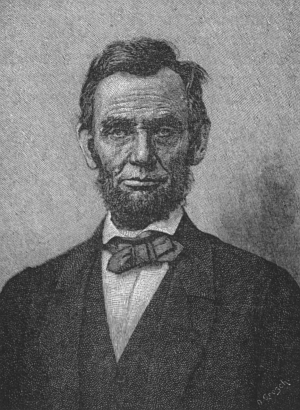 ABRAHAM LINCOLN.
ABRAHAM LINCOLN.
Thom-as Lin-coln, who was the fa-ther of A-bra-ham Lin-coln, had seen a sad sight when he was but a boy of eight years; while he and his brothers were hard at work with their fa-ther in the dense, wild woods which grew close to their small home in Ken-tuck-y, an In-di-an chief crept close to them; he fired one shot, and the boys saw their big, strong fa-ther fall dead. They were brave boys, and while one ran for help, the oth-ers kept at bay the In-di-ans who came from the woods. A band of men soon came to their aid, and drove the fierce red men back to the woods. It was a rough, hard life in which Thom-as Lin-coln grew up; and he could not read or write when, at twen-ty years, he took as his wife Miss Nan-cy Hanks; she was a bright girl and soon taught him at least to write his name.
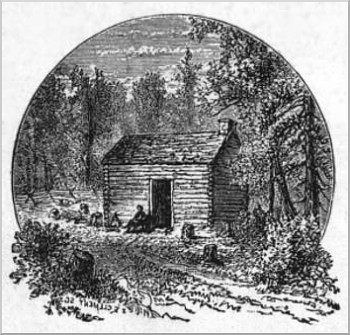 LINCOLN'S EARLY HOME.
LINCOLN'S EARLY HOME.
It was a poor log-house in Har-din Coun-ty, Ken-tuck-y, to which he took his bride; and yet in this home so mean and small, was born, on Feb-ru-a-ry 12th, 1809, the boy who was to be pres-i-dent of this great land. Few boys and girls know what it is to be as poor as this lit-tle boy was, or to lead as hard and sad a life. His clothes were thin and poor, his shoes, when [Pg 61] he had an-y, were oft-en full of holes; he did not al-ways have as much as he would like to eat, and in the long, hard win-ters he was oft-en ver-y cold. It was not an eas-y life, and it was full of hard work, for peo-ple in this rough place could not read and there were no schools; but when he was still a young boy his folks moved to In-di-an-a, and though there was more work to be done, life was not quite so sad, for he and his sis-ter Nan-cy now had a play-mate, their cous-in, Den-nis Hanks, who was full of life and fun. "Abe," as folks called him, was but eight years old when his par-ents went out into the West to live, but he was so strong that he could help chop down the trees of which the new home was made; then, too, he learned how to shoot the game and wild fowl in the big woods, and so could bring good things in-to the house to eat. But a dark time came in his life soon, for the kind, good moth-er took sick and died. Her death was a great loss to "Abe," and he felt much grief that there was no one to say a pray-er at her grave; so he wrote to the min-is-ter in the old home in Ken-tuck-y, and asked him if he would not come there and bless his moth-er's grave. This good man came as soon as he could, but it was a long while af-ter her death be-fore "Abe" had his wish. That win-ter was long and hard for the poor lit-tle boy and girl with no moth-er to see that they were warm, or that they had good food to eat; but in the fall of 1819, the fa-ther brought home a new wife, Mrs. Sal-ly John-son and now at last a ray of bright light came to stay with "Abe" and Nan-cy. The new moth-er was a good, kind wo-man, and was quite rich for those days. She soon had the home bright and neat; she put good warm clothes on "Abe" and Nan-cy; saw that they had food to eat and at once sent them to school.
"Abe" was now e-lev-en years old, tall and big, and of more strength than most boys of his age. His fa-ther hired him out for all sorts of work; to pitch hay, to chop wood, to help on the farm; no work was too hard for this big, strong boy; but, with all this work, he kept at his books too. Late at night, while all the rest slept, he would stud-y his books; and as books were few he read them ma-ny times o-ver; one of the books he loved the most was the "Life of Wash-ing-ton."
He was a young man, for it was in March, 1828, that a chance came to him to see more of life; he was hired to take a boat filled with skins down the Mis-sis-sip-pi Riv-er to New Or-le-ans; he did this work well, and when he came back was paid a good price for it. He was just of age when his folks went to Il-li-nois to live; and now he helped build a home, cleared a big field in which it stood, split rails to fence it in, and then went off to make his own way in life.
The first thing he did was to help build a flat-boat and then take it down to New Or-le-ans; when he came back the man who owned the boat gave him a place in his store at New Sa-lem; and now he had a good chance to get books to read; and you may be sure he was glad of this. He was soon known in the place as a bright young man, and one who would not lie, or steal, or do an-y mean thing; he was full of fun and jokes, and the folks in the town were all fond of him; he was called "Hon-est Abe." When the "Black Hawk War" broke out he went at the head of a small band of men to the seat of war; he was in no great fight, but learned much of war and how to rule the rough men who were in his care.
When he came home he was felt to be one of the first men in the town, and in 1834 he took a high place in the state. [Pg 63] He now took up the stud-y of law, and was soon in ac-tive prac-tise; he had a good, kind heart, and did much good to those who were too poor to pay him. In 1846 he was sent to Con-gress; this time he was there but one year; then came back to Spring-field, Il-li-nois, and built up a fine law prac-tise. His name was now known through all this great land; and in the slave strife he was al-ways on the side of the slaves. He spoke so oft-en for the slaves that in 1860, the South said if he was put up for pres-i-dent, by the North and West, they would leave the Union. But he was just the man to fill this high office at this time; and as he had the most votes he took the of-fice of Pres-i-dent in 1861. There is a sto-ry told of these days, which shows that Lin-coln, when a great man, had no shame for the days when he was poor. Old John Hanks, who had helped him build that rail fence so long a-go, came to Il-li-nois with two of those rails; and on them was a big card which told where they came from, and who split them. Lin-coln was just a-bout to make a speech to a big crowd; and when he saw these rails he said that he had split them when a boy, but thought he could do bet-ter now. Then shouts and cheers went up from the crowd, you may be sure; and from that time Lin-coln was known in the race for pres-i-dent as "The Rail Split-ter."
When he left his home to go to Wash-ing-ton, a great crowd came to see him off, but he was so sad he could not say much to them. There were plots to kill him at this time, and he knew it; but he gave no thought to his own life, and went straight to his post of du-ty as Pres-i-dent. It was with a sad heart that he saw this great land torn with war; and he would have been glad to keep peace, but this he could not do. When the South fired at the flag of [Pg 64] the Un-ion at Fort Sum-ter, a cry went up through the whole land. The South fought for what it called "States Rights;" the right of each state to rule in its own way; but this Lin-coln would not have. He cared more for the Un-ion than he did for the slaves; for, though he thought all men should be free, he said, if he could save the Un-ion, he did not care if not one slave was made free; he had no wish to keep the South from its rights; but, at last, he felt it wise to send out a bill, which said that all the slaves should be free, and have the same rights as white men. This land was in no state for war; much had to be done; clothes and food got for the troops; and arms as well had to be made or bought at once. The first great fight was at Bull Run in Vir-gin-i-a; and the loss of life on both sides was great; the North lost from the first; men who had nev-er been in a fight be-fore went mad with fear and ran for their lives. But at the fight at Get-tys-burg the men of the North were brave and fought with such skill that the great fight was won by the North.
Grant was put at the head of the troops who went down to free Mis-sis-sip-pi; and it was not long be-fore he placed the Stars and Stripes over this fair state. The South made a brave fight, for what it thought was right and just; but as the war went on, the troops of the South were in a bad state; they could get no food, no clothes, and so ma-ny men had been shot that in the last years of the war young boys had to help fill up the ranks. Now came Sher-man's march to the sea, and he took Sa-van-nah and all its guns and stores. This was a great blow, and now one by one the sea-ports of the South fell in-to the hands of the North. At last Gen-er-al Lee, a great and good man of the South, sent word to Grant that he would come to terms and make peace. [Pg 65] Grant was kind at this hard time; he let Lee keep his sword, and said that the men might keep all their hors-es. It was in A-pril, 1865, that peace came to our great land; and the North went mad with joys; bells pealed, and fires blazed in the streets; flags were raised and guns were fired; but in the South there was no joy; on-ly great grief.
From the grief of the South a great crime sprang; on the night of A-pril 14th, as Lin-coln sat in a box at the the-a-tre watch-ing a play he was shot by a man from the South named Wilkes Booth. When he had shot Lin-coln, this man sprang on the stage and tried to run from the place; he fell and broke his leg; but in this state he got to the door, where he jumped on his horse and fled for his life. He was found at last in a barn, and made such a brave fight for his life that the barn had to be set on fire be-fore he could be caught; e-ven then he would not come out and give him-self up; but fought till he was shot down where he stood.
Lin-coln had been shot in the back of his head, and could not move or speak;—men took him with care to a house near by, but there was no help for him; and in the ear-ly morn of the next day a great life came to a sad end. The whole land, the South as well as the North, wept at his death; for no sane man felt that Booth's deed was wise or just; and to this day the name of A-bra-ham Lin-coln, the "Sav-iour of his Coun-try," is held dear by North and South.
An-drew John-son's life as a boy was quite as hard as that of lit-tle "Abe" Lin-coln. He was born in Ra-leigh, North Car-o-li-na, on De-cem-ber 29th, 1808, in a small log cab-in; and near his home were the big farms of the rich men of the South, on which lived in more ease than he the slaves, who looked down on his fa-ther and mo-ther as "poor white trash."
His fa-ther died when An-drew was but four years old; he must have been a brave man, for he lost his life try-ing to save a man from drown-ing. Lit-tle An-drew was too poor to go to school; he had to try and earn mon-ey, when he was but ten years old; so he was sent to a tail-or to learn to make clothes; here, for five years he worked hard; and then he heard a man read; and for the first time it came to his mind that he could learn to do this; he got the men in the shop to teach him his "A, B, C;" and he was so quick to learn that soon he could read a lit-tle; but it was not till he was wed to a bright young girl that he learned a great deal of books; this was when he was eight-een, and he had gone to Green-ville, Ten-nes-see, to set up in life for him-self. These young folks were both poor, but both bright; and the wife was a great help to John-son all through his life. He rose fast in his new home; we see him, from the first, take the part of the poor; and he was soon put in high of-fice in the town; it was not long ere he rose to a high place in the state, and, in 1843, we see the poor lit-tle tail-or boy [Pg 67] of 1826 in the halls of Con-gress, stand-ing up for the rights of the class in which he was born. In 1846 he took the seat of John Quin-cy Ad-ams, who was too sick to hold it; does it not seem strange that two men who had lived as boys so un-like should rise to just the same place? For ten years he was in Wash-ing-ton, where he helped make the laws of the land; then in 1853, he was made gov-ern-or of Ten-nes-see. When the Civ-il War broke out, he took sides with the North, though he was born in the South and lived there; and when Lin-coln was made pres-i-dent he took the next place as vice-pres-i-dent.
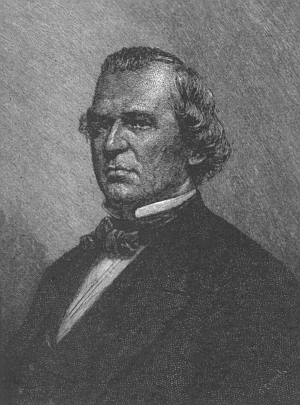 ANDREW JOHNSON.
ANDREW JOHNSON.
On Lin-coln's death, he took the pres-i-dent's chair. The whole land was now up-set; in the South the white men had no work; and the slaves did not know how to care for them-selves. In the North there was strife as to the terms on which the South should come back in-to the Un-ion; and on ma-ny things John-son and his Con-gress did not think the same; so there was strife be-tween them. It came to its height in 1868, when the Sen-ate tried John-son for "high crimes and mis-de-mean-ors;" this means that Con-gress thought the pres-i-dent did not act for the good of the land, and should be put out of of-fice; but the men who tried him did not all think the same; and most of them said he should keep his place.
So he was in the chair for four years, and then went home to E-liz-a-beth-town, Ten-nes-see, where he lived till his death on Ju-ly 29th, 1875.
The boy who was to be first a great gen-er-al in the ar-my, and then Pres-i-dent of the U-nit-ed States, was born at Point Pleas-ant, O-hi-o, A-pril 27th, 1822. As a boy he did not care for books, but was fond of sports and games, and had a great love for horses; he was but eight years old when he put a young colt to a sled, and hauled sticks and logs from the woods to his home; and he was but twelve when he made a trade of a horse he had for a young colt which had not been used much; on his way home a dog sprang at the colt, which, at once, mad with fear, tried to run a-way; the boy held fast to his reins, and stopped the colt just on the edge of a great cliff; but it was in such fear that it would not move, and the boy for a time knew not what to do. At last he took his hand-ker-chief, tied it o-ver the colt's eyes, and so drove him home. Folks near the Grant home said there was no horse which young U-lys-ses could not ride; he was a boy who had a firm will and strong nerves; and was at the head in all sports or games; for young boys soon learn which one of them must take the lead.
He did not stand so high in school, but did his tasks well; and in 1839 he went to West Point. Here he soon had ma-ny friends; and they gave him a name which clung to him for life; he was called "Uncle Sam," from the U. S. in his first two names. At West Point, he read a great deal of war, and the men who had done brave deeds for their [Pg 69] coun-try; and when he left there he was, at heart, as well as in name, a sol-dier of his coun-try. He at once took his place with the troops, who were at war with the In-di-ans in the West; but his first big fight was at Pa-lo Al-to in 1846. At the close of this war Grant, who had shown much skill, and knew no fear, was sent to the West once more to force the In-di-ans to keep peace.
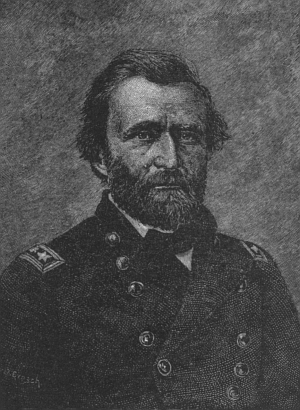 ULYSSES S. GRANT.
ULYSSES S. GRANT.
He was in Cal-i-for-ni-a while the gold craze was at its height, to try and make the rough men who came in search of gold keep the laws of the land. Then, from 1854, he had a few years of peace, and start-ed to tan hides and skins, in Ga-le-na, Il-li-nois; but his life was ev-er at his coun-try's call; and he was one of the first men to take up arms in the Civil War. He was made a gen-er-al soon af-ter the war broke out; and one of his first acts was to block all the streams and roads near his post at Cai-ro, on the O-hi-o River, so that the South could get no food or arms. Grant was known as a brave fight-er, and oft-en was in the midst of the fight at the head of his men. At a great loss of life to his troops, he took two strong forts from the South, Forts Hen-ry and Don-el-son; and then came that great fight at Shi-loh; where the troops of the South were cut down, and the North won the day; Grant was now put next to the head of the whole ar-my; and at once tried to take the cit-y of Vicks-burg. The siege of this cit-y was hard for those in its walls, and for the troops in front of it; for Grant and his men could get no food from the North, and the cit-y was quite cut off from help. The cit-y made a brave stand for two long months; but had to give in at last, and at the end of that time Grant and his men marched in-to the cit-y; now this great gen-er-al showed what a kind heart he had, for he gave food and clothes to the [Pg 70] poor men who had fought so long and so well, to save their town; and he tried hard, at this time, to think of some way to bring the war to a close. Grant was not a hard man, but he was a just one; and in his camps, the men must live the right sort of lives; he would not let his men steal food from the farms a-bout them, or rob the poor folks in their homes. He was a plain man, and his dress showed his plain tastes; once, when he had his troops march past him, that he might see how they looked, he wore such a plain garb that his cap-tains were dressed bet-ter than he. He wore no sword, sash, nor belt; just a plain, dark suit, with a soft felt hat on his head, and a pair of kid gloves on his hands; he was a great smoker, and, it is said, his big plans were all made when his ci-gar was in his mouth. In 1863, Grant won a great fight at Chat-ta-noo-ga; and in the fierce fight in the Wil-der-ness, he and Gen-er-al Lee met for the first time.
Grant's next great work was to seize Pe-ters-burg; and so he laid siege to the town; he dug a huge mine in front of the doomed cit-y, and filled it full of pow-der that would go off when fired with a match; when this great charge went off, the fort was blown to small bits, and heaps of dead and dy-ing men lay in the midst of the ru-in; but the brave men of the South still held the fort, and drove back the troops from the North as they rushed up; and so well did they fight that Grant and his men had to draw back, and leave Pe-ters-burg a-lone for some time.
The next time he tried to take the town though, Gen-er-al Lee, who was in charge, was forced to yield; and soon the red, white and blue waved o-ver the South-ern cit-y. Soon af-ter this, Grant took from Lee all the troops in his charge; [Pg 71] and it was now plain to see that the war must soon end.
You read in the life of Lin-coln, of the terms of peace which Grant gave to the great chief of the South; and it seems that these two men, Grant and Lee, had no hard thoughts for each other; for when peace was made, they shook hands, and part-ed friends. Each had done his best in the cause he thought right. Grant's trip to the North when the war was at an end was a grand one; crowds rushed to see the man who had saved the Union, and cheers and shouts rang to the skies. He was, of course, named for pres-i-dent and a great vote put him in of-fice.
He was in the pres-ident's seat for two terms; and was the on-ly man since Wash-ing-ton, who was thought of for a third term; but this the whole land said no to; as no man should be pres-i-dent longer than Wash-ing-ton had been. In Grant's last term, a big fair was held in Phil-a-del-phi-a, called the "Cen-ten-ni-al;" to keep in mind this was the great day on which this land was made free. At the end of Grant's two terms, he took a tour of the world; and all lands made much of the sol-dier pres-i-dent; rich gifts were placed in his hands; and at the courts of the old world, kings and queens were glad to have this plain qui-et man as a guest.
His last home was in New York; and here, in 1884, he fell sick; he lost much mon-ey at this time, and was, in truth, a poor man. But he was, to the last, a brave man; and in the midst of much pain, he wrote the book of his life, that when he was dead his wife should have mon-ey from its sale.
He died after eight long months of great pain, at Mt. Mc-Greg-or, near Sar-a-to-ga, on July 23d, 1885; his bod-y lay in [Pg 72] state in New York for some days, and crowds from far and near came to view this great man for the last time.
He was laid to rest Au-gust 8th, 1885, at Riv-er-side Park, New York Cit-y; and the white mar-ble tomb that marks this spot is a gift to the great dead, from the land he served so well.
Ruth-er-ford B. Hayes was born in Del-a-ware, O-hi-o, Oc-to-ber 4th, 1822; such a strong, ro-sy lit-tle boy was he, that he had the pet name of "Rud-dy;" his fa-ther had a big farm and a store as well, so he was quite rich, and lit-tle Rud-dy grew up in a bright and hap-py home. He came of a race of brave men, who had fought and died for this fair land in the wars of the Rev-o-lu-tion and of 1812; and he grew up as brave as they. He and his lit-tle sis-ter Fan-ny went when young to a small school near their home; and the good, wise moth-er helped them with their books at home; Ruth-er-ford worked hard at school, and went when quite young to the high school, where he soon stood at the head of his class. He was six-teen when he went to Ken-yon Col-lege, Ohio. Now, though he was so good at his books, he loved sport and fun as well; and he was so strong, that he could walk miles on the cold-est of days, and yet get no hurt. Once he walked all the way from col-lege to his home and back, when the snow lay deep on the ground, and this was for-ty miles; he could swim and skate, and knew how to fish and hunt; the boys at col-lege all liked him; he had hosts of friends, and the strong, brave will that kept him at the head in games and sports put him first in his class too. He left col-lege in 1842, and took up the stud-y of law at Har-vard Col-lege; in 1846, he was made one of the bar, and took up prac-tise of law in Cin-cin-nat-i. When the Civ-il War broke out, he, as cap-tain of a band of men from his home, did brave, good work. Once he was shot and fell to the [Pg 74] ground; but he did not give up; he told his men what to do as he lay there in great pain, and kept up till some one came to take his place as lead-er. At the end of the war, he was a gen-er-al; and was much loved by his men. He was sent to Con-gress by his state; and then made its gov-ern-or for three terms. In 1876, he was made pres-i-dent; though some thought by a fraud in the count; and the Dem-o-crats said that their man, Sam-u-el J. Til-den, should have been pres-i-dent. While Hayes was at the White House, there was a great la-bor strike, from the East to the West, on all the rail-roads. The heads of the roads said that they would not pay the men, in their hire, as much as they had done; and so, all the men left their work and no trains could run, for the men came in great mobs to stop them; at last, they rose in arms, and then the troops were sent out to force them to keep the peace; nine men were killed, and some of the rest were bad-ly hurt. But the men did not give up for a long time; they held Pitts-burg for two days, and burned cars and the grain kept in them.
Of course, in the end, the law had to be o-beyed and the mobs were made to come to terms, and lay down their arms.
There was a war with the In-di-ans while Hayes was in the chair; but this was put down by Gen-er-al How-ard; and after some fierce fights, the chiefs were caught and bound to keep the peace. There was a change made in the way of life at the White House while Hayes was there, for no wine was ever put on the ta-ble for guests or for the pres-i-dent and his wife; this was the first time, and so far, the on-ly time, that wine has not had its place at least at the state meals at the White House. Hayes was in Wash-ing-ton for one term and then went to his home in Mas-sil-lon, O-hi-o. He died on Jan-u-a-ry 17th, 1893.
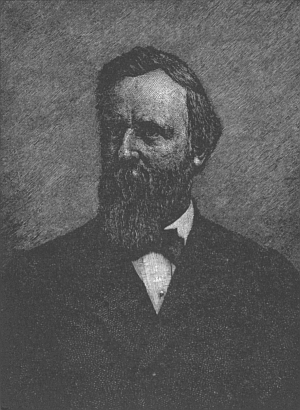 RUTHERFORD B. HAYES.
RUTHERFORD B. HAYES.
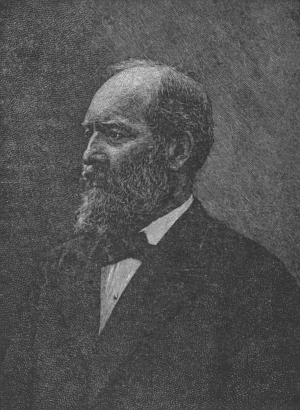 JAMES A. GARFIELD.
JAMES A. GARFIELD.
In rough log cab-ins, out in the midst of wild woods, we have read that six of our pres-i-dents were born; the sev-enth, James A-bram Gar-field, was born in Or-ange, O-hi-o, on No-vem-ber 19th, 1831.
His fa-ther had built, with his own hands, their small, rude home; and it stood deep in the wild wood, whose trees would, at times, catch fire from the sparks thrown from the steam en-gines some miles off. Near the Gar-field home was their field of grain; one day this caught fire, and in trying to save his wheat, the fa-ther of lit-tle James lost his life. It was a hard life to which he left his young wife and the four lit-tle ones; but she was a brave good wo-man; she had to work hard of course, and so did the boys; but the moth-er taught them from books as well; and lit-tle James was but four years old when he went to his first school. He was a tough, strong boy, and soon did a large part of the farm work; in the long sum-mers he had the most work to do, and then in the win-ters he could go to school; he was a brave boy, for the school was miles from home, and his road lay through the deep woods, in which wild beasts roamed at will. But he went his way, and if he felt fear, did not show it; he had a great love for books, and late at night, with the big wood-fire for his light, he would read o-ver and o-ver his few books. His moth-er had taught him to love the Bi-ble, and this Good Book he knew well. But, at last, the time came when he was so old that he [Pg 76] could leave home, and so help the moth-er more than he had done. The first thing he did was to drive mules on the tow-path of the O-hi-o Ca-nal; here he earned $10.00 a month, but the men he met were coarse and rough, and the life rude and vile; so, with a sad heart, the young boy, fresh from his good home in the qui-et woods, took what he had made here, and went back to the place he loved. He was sick for a long while now; and as he lay on his bed, he made up his mind that he would go to col-lege, and lead a good, use-ful life out in the big world; that he would use his brains more than his hands. With this hope in front of him, he made mon-ey in the sum-mer to pay his way at school in win-ter; and soon knew all that they could teach and went to Hi-ram Col-lege; here at first he did all sorts of work to pay his way; rang the bells, swept the floors, and built the fires; but he was soon paid to teach in the col-lege, for he was too bright and quick to do such hard work long. In 1854, he went to Wil-liams Col-lege, and left at the head of his class in 1856.
From now on he rose fast; he taught school when he left col-lege; his boys loved the big strong man and said so much in his praise, that men learned to love him too; and in 1859 he was made one of the O-hi-o Sen-ate, and soon af-ter sent to Con-gress. Then came the Civ-il War, in which he fought brave-ly; he won much fame in some of the great bat-tles, and was made a gen-er-al. He was a warm, close friend of Lin-coln; and on the day of Lin-coln's death, it was Gar-field who spoke such calm, good words to a mob of men on Wall Street, New York, that he kept them from rash acts at this sad time. At the close of the war, Gar-field was in Eu-rope for a short time; and when he came home, he was sent to Con-gress, where he kept his seat for a [Pg 77] long time. In 1880 he was named for pres-i-dent, and took his seat in 1881. But there was a great grief in store for this land, once more. On July 2d, 1881, just four months from the time he took his seat, Gar-field was shot by Charles Gui-teau, as he, with James G. Blaine, was on his way to take a train north from Wash-ing-ton. They bore him back to the White House, and the man who had done this foul act was seized. The whole land prayed for Gar-field's life, but he grew worse fast; and it was thought best at last to take him to Long Branch, where it was cool-er than in Wash-ing-ton. But the long, hot months dragged on; and the sick man did not grow well in the cool salt air, as it had been hoped; in spite of all care, the pres-i-dent failed day by day; and on Sep-tem-ber 19th, 1881, the whole world heard with sorrow of this good man's death. The great men of the day wept side by side, as Gar-field lay in state in Wash-ing-ton; and men of note, in all walks of life, felt his death as a great grief. He now lies at rest in Cleve-land, O-hi-o. Gui-teau was hanged for the crime he had done; and it is but just to say, that some thought he was not in his right mind when he shot Gar-field.
Ches-ter Al-an Ar-thur was born in Fair-field, Ver-mont, on Oc-to-ber 5th, 1830, and his fath-er had charge of the church in that place and was one of the first men to speak for the poor slaves. Now, in those days, those good men did not live as well as they do now; for folks were poor in the small towns; so this small boy was al-so born in a log cab-in; but he was sent to good schools, and was quite young when he knew so much that he could go to Un-ion Col-lege. All the time he was here he paid his own way, and when he left Col-lege he taught school, so that he could lay by means to go to New York and stud-y law. He was soon in law prac-tise, and he and an old school-mate made the name of their firm well known. Ar-thur took the part of the black race, just as his fa-ther had done, and in 1856, he won a suit which let the ne-groes ride in horse-cars with the whites. A slave-girl had been put off a car and Ar-thur took up her case and won it. For some years he held high of-fice in the state of New York and was a gen-er-al in the Civ-il War; he was not in the fights, but saw that the troops had clothes and food; he did this hard task so well that, when the war was at an end, the pres-i-dent gave him the best place in New York State; he was made chief of the great port of New York and held this post for two terms.
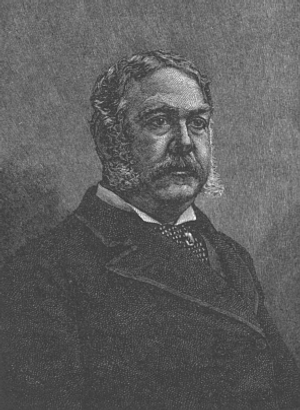 CHESTER A. ARTHUR.
CHESTER A. ARTHUR.
In 1880 he was made vice-pres-i-dent with Gar-field as pres-i-dent; and, of course, took the chair when Gar-field died. He held this place for one term and then went back [Pg 79] to his home in New York Cit-y, and took up his law work. There was a split in his par-ty at the end of his term; some men wished Ar-thur to run once more for pres-i-dent, but more wished James G. Blaine of Maine; so, of course, Blaine was named. The Dem-o-crats named Gro-ver Cleve-land; and as all the men on that side wished this one man to win, he had the most votes; and for the first time in a long while, the Dem-o-crats won in the race for pres-i-dent.
Two years from the time that Ar-thur came home, and right in the midst of his law work, he died in New York Cit-y; this was on No-vem-ber 18th, 1886; and he was laid to rest in Al-ba-ny.
The race of brave, strong men from whom Ste-phen Gro-ver Cleve-land sprang made their first homes here, in Mas-sa-chu-setts, as far back as 1635. His fa-ther had charge of a small church in Cald-well, New Jer-sey, and here, in a neat white frame house, which you may see for your-selves to-day, was born, on March 18th, 1837, the boy who was to rise, step by step, to the pres-i-dent's seat.
He was three years old when they moved to Fay-ette-ville, New York, and here he first went to school and lived till he was twelve years old. He showed a strong will, and a great love for books, as a small boy; he would have his own way, if he could get it; and this was why he was sent to a high school, when he was not so old by some years, as the rest of the boys there; he gave his fa-ther no rest till he sent him; and once there he made up his mind to lead his class.
He was just twelve when his strong will sent him to work in a store near his home, so that he could help care for the big fam-i-ly in the small home. The man who hired him, soon saw that, if he was young, he knew how to work well, and that he could trust him; for two years he worked in the store and then went back to his books.
But, just at this time, his fa-ther died; and he then had to find a way to care for those in great need at home. With the same pluck that he had shown in the past, he now went to work in a "Home for the Blind," in New York. In this big cit-y, the bright boy saw and heard much which gave him [Pg 81] new thoughts, and put in his heart the wish to make his life a great one. At the end of two years in the "Home," he made up his mind to learn law; and he asked a man whom he knew to lend him twen-ty-five dol-lars to start him. The fact that this man did so shows that he had trust in young Gro-ver Cleve-land; he could now start his work, and went to Buf-fa-lo to do so. Here he lived for eight years; at first he helped his un-cle, in the care of a big farm, and the mon-ey he so made was sent to his moth-er. Soon he had the chance to stud-y law; the place where he went was two miles from his un-cle's home, but back and forth, rain or shine, he walked each day. There is told a tale that shows how he loved the books of law; for, the first day he went to this place, a book was put in his hands to read; he kept at it for hours, till dark came; then he found the rest of the men had gone home; all the doors were locked; and he must stay there all night.
Such hard work soon made him a man who well knew the law; and folks gave him big cases that brought him much fame. He did not go to the war, when it broke out, for he felt that he could not leave his folks at home with no one to care for them.
He rose fast in his law work; and more than one great case did he win; he cared far more to take the part of the poor than of the rich; and at no time in his life did he look for high place or fame; it came to him though, for he was just the man to fill a high post well. His name was soon known in his state and at Wash-ing-ton; for three years he was Sher-iff of E-rie Coun-ty and then he took up his law prac-tise once more; but soon he was put at the head of his cit-y as its May-or; and then was made the Gov-ern-or of the great state of New York. Here he did good work; he put down [Pg 82] those who had tak-en bribes, and had not been good, true men, and he tried to see that the laws were well kept; men saw that he was the right man to fill this high place, for he had no fear of what might be thought of him; he just did as he felt right; and so, while he was still gov-ern-or, he was named for pres-i-dent by a great vote, and was e-lect-ed. When he took the oath of of-fice in Wash-ing-ton, he did not kiss the big Bi-ble which oth-er pres-i-dents had kissed, but a lit-tle old book, much worn with use, which his moth-er had giv-en to him when he first left home. He was in the chair four years and while here, he took for his wife Miss Fran-ces Fol-som; he was the first pres-i-dent to wed in the White House. Cleve-land was pres-i-dent for four years; at the end of that time, the Re-pub-li-cans placed Ben-ja-min Har-ri-son in the pres-i-dent's chair.
But, at the end of one term, once more the Dem-o-crats won the day; and a-gain, in 1893, we see Gro-ver Cleve-land pres-i-dent.
In May of 1894, the World's Fair was o-pened; and few boys and girls are too young to know some-thing of the beau-ty of the Great White Cit-y built on the shores of Lake Mich-i-gan in Chi-ca-go. In the last years of Cleve-land's term, there was much talk of the state of things in Cu-ba. The men there wished to be free from Spain, who had ruled them, with a hard hand, for hun-dreds of years.
Spain sent down troops of sol-diers; and harsh laws were made to force the Cu-bans to keep the peace. But Cu-ba would not give up; and the U-ni-ted States be-gan to feel pit-y for this brave lit-tle is-land, try-ing to get free.
In the midst of the strife, Cleve-land's term of of-fice came to an end, and he came to New York to live and take up law a-gain. He now has his home in Prince-ton, New Jer-sey, and has a large law prac-tise.
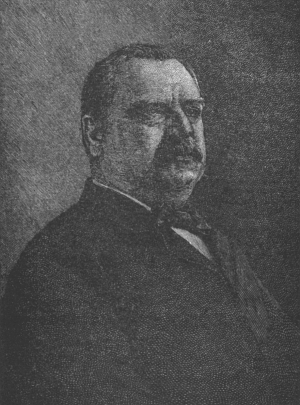 GROVER CLEVELAND.
GROVER CLEVELAND.
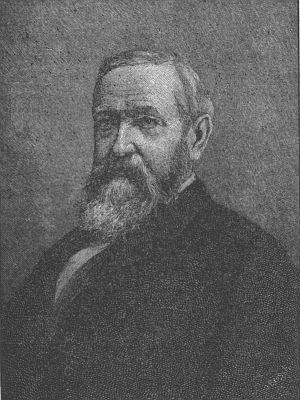 BENJAMIN HARRISON.
BENJAMIN HARRISON.
In the first part of this book, you heard of a brave In-di-an fight-er, whose name was Wil-liam Hen-ry Har-ri-son; and you saw this brave man mount step by step to the pres-i-dent's chair. It is his grand-son, Ben-ja-min Har-ri-son, whom we now see pres-i-dent of the U-ni-ted States. He was born in his grand-fa-ther's home at North-Bend, In-di-an-a, on Au-gust 20th, 1833. There were no good schools near his home; so in a small log house, in his grand-fa-ther's grounds, he first went to school; he and a few oth-er boys and girls were taught here by those whom the Har-ri-sons hired. In this school the seats were of planks, laid on sticks that were stuck in holes in the floor; they had no backs; and were so high that the small boys and girls could not touch their feet to the floor. On-ly in the win-ter did this small boy go to school; in the sum-mer he had work to do on the big farm; he did his work well; but he also learned to shoot, to fish, to swim, and to ride.
He was much liked by all the boys, for he was full of sports and jokes. In 1820 he went to Mi-a-mi Col-lege, and left in 1822, to stud-y law. In one of his first cases, the light was so dim, that he could not see the notes he had made with such care. What should he do? There was but one thing he could do: fling to one side the notes and plead his case without an-y. This was a hard thing to do; but he did it so well, that he won his case; and the great men of the day gave him much praise for his speech.
When the Civ-il War broke out he raised a troop of men, from his own state, and was made the col-o-nel of this band, which was called the "70th In-di-an-a."
He served for two years, and won fame in some of the great bat-tles of the war; so brave was he at Re-sa-ca, that he was made a Brig-a-dier Gen-er-al. Through the long years of war, he was kind and good to the men in his care; they loved him well, and gave him the name of "Little Ben."
Not till the war was at an end, did he leave the field; then with much fame, he went back home, and took up his work at law. He took a high place in his own state and made some great speech-es.
It was now the year 1889; just one hun-dred years had passed since Wash-ing-ton, our first pres-i-dent, took his place as Pres-i-dent of the U-nit-ed States; and the whole land thought it right to cel-e-brate the date. So in New York Cit-y, on A-pril 29th and 30th, was held the "Wash-ing-ton Cen-ten-ni-al." The cit-y was hung from end to end, with red, white and blue; the grand, good face of Wash-ing-ton, framed in the flag of the land, or wreathed in green, looked down on the gay scene. Rank by rank, the troops filed by a-midst the shouts and cheers of the dense crowds that filled the streets, and looked from the win-dows of stores and hous-es. Rich and poor, great and small, kept this great day; the pres-i-dent and oth-er great men from Wash-ing-ton were brought to the foot of Wall Street, on a barge hung with flags; here all the ships of war were drawn up on each side; and as the par-ty went to the spot where Wash-ing-ton took his oath of of-fice, young girls, clad in white, cast flow-ers be-fore them. As the troops filed past the pres-i-dent, one saw, not just those from the North; but up [Pg 85] from the South came hosts of men, bearing the flags of their states; all glad to share in this great day of the na-tion; and there were men from across the seas too; the Ger-mans and the French marched side by side with the A-mer-i-cans. By night, fire-works and bon-fires filled the streets with light, and blazed in beau-ty; no such great time had ever been known in this land; and this was as it should be; for it was all done for the great, good man, who had led our troops so well in our first war, that he had made us free; and had then, by a wise and just rule, helped us to be the great, strong land that we are to-day.
While Har-ri-son was in of-fice, work was be-gun for the "World's Fair," which was held in Chi-ca-go, in 1892, just four hun-dred years since Co-lum-bus first saw A-mer-i-ca. Har-ri-son went to Chi-ca-go and o-pened the fair with a speech on Oc-to-ber 14th, 1892; but folks could not go there till the next year. In 1893, Har-ri-son went home to In-di-an-a, and took up his law work, once more; he is still a-live, is well known as a good law-yer, and has many warm friends a-mong the great men of our day.
We have seen that Gro-ver Cleve-land now be-came pres-i-dent; at the end of his four years, the Re-pub-li-cans put Wil-liam Mc-Kin-ley in of-fice.
The man, who now, in the year 1900, stands at the head of our great land, was born at Niles, O-hi-o, on Jan-u-a-ry 29th, 1843. In the schools near his home he was taught his let-ters and, as a child, was fond of books, and quick to learn. He was a mere boy, when he taught school to earn the means to go to Col-lege. The school-house in which he taught still stands; it is a plain, square, white house, with two win-dows in front and three on each side. His moth-er was a good wo-man, with a clear, strong brain; she taught him, as well as his eight broth-ers and sis-ters, to love truth, and to live brave and strong lives.
Young Wil-liam was not long to lead a life of peace; for in 1861 he, then but a boy of eight-een, left his books and his home, and went to the war. Many sto-ries prove how brave he was while there; but two will show you why he rose so fast from the ranks. At one time the guns had been left on the road, af-ter a great fight; and it would be a hard task to go back near the foe to get them. But, young Mc-Kin-ley said, "The boys will haul them;" and he and a few oth-ers went back for them and brought them into our lines. Then he was at one time two miles from the fight, in charge of the food; he was quite safe; but he thought our men would fight bet-ter, if they had some cof-fee and food. So he filled a cart and drove straight to the lines, where our brave men were hard at work. Was this not a brave act? To risk his life for the sake of tak-ing food and drink [Pg 87] to the worn men. He worked his way straight to the front and came out of the war a cap-tain. He went home at once and took up the stud-y of law in Can-ton; one of his first speech-es was for the rights of the black men; he said that they should have the same right to vote that white men had; and he was ev-er on the side of the black man. In 1869 Mc-Kin-ley was mar-ried to Miss I-da Sax-ton. They were both very young when their two lit-tle chil-dren died. The young law-yer did all he could to cheer his wife; and she was as brave as he, and did not let her grief keep him from his work. He rose fast in his state, and held high place more than once; then, in 1877, he was sent to Congress. In 1891 he was made gov-ern-or of O-hi-o; and in 1897, he had made such a great name for him-self that he was put up for pres-i-dent by the Re-pub-li-cans, and e-lect-ed. Just as he came in-to of-fice, the strife in Cu-ba was at its height; and men here in our great, free land had much pit-y for the Cu-bans, who were try-ing to get free from Spain, just as we had tried to shake off the hand of Eng-land long years a-go. The Span-ish rule grew worse and worse, as Spain found that Cu-ba would not give in. At last Gen-er-al Wey-ler, a harsh and cru-el man, was sent there to force peace on an-y terms; but Gen-er-al Go-mez knew his foes well, and his brave men fought with a strength born of a great hate for Spain. By and by, when Spain saw she could not win the day, she sent word that if Cu-ba would lay down her arms, she could have the rights for which she had asked in vain in the past.
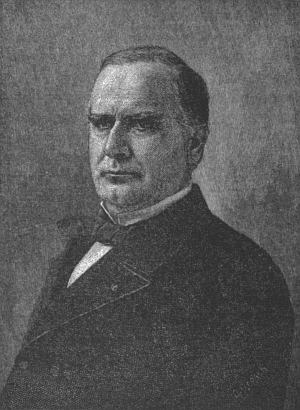 WILLIAM McKINLEY.
WILLIAM McKINLEY.
But it was too late; Cu-ba had no faith in Spain, and would now be free from her hard yoke. There was much want in the big towns of Cu-ba at this time, for Wey-ler had made all the poor folks, who had lived in peace on their small [Pg 88] farms, come in-to the towns. He said they gave help to the Cu-ban troops, and so he forced them to leave their homes and would on-ly let them bring with them just the few things that they could put on their backs. Then he had their lit-tle homes, and their crops which they had raised with care, all burned to the ground. He had lit-tle food to give this great host of poor peo-ple, and ma-ny died in the streets for the want of bread. You may be sure that our great land saw the pain and want down in Cu-ba, and longed to give aid; but an act of help on our part would mean war with Spain, and this Mc-Kin-ley did not wish. But there came a day when a great cry went up through the U-nit-ed States at a foul deed done in the bay of Ha-va-na. Our great war ship, the "Maine," was blown up by a bomb, as she lay at an-chor in the har-bor. The thought of our poor men sent to such a death raised the cry of war in all hearts. "Re-mem-ber the Maine," was the war-cry; and men cried for war at once with Spain. But Mc-Kin-ley gave Spain one more chance to stop the fight and free Cu-ba; this she would not do. So on A-pril 21st, 1898, once more the U-nit-ed States had to make read-y for war. From all the states men poured in and camps sprang up here and there, where the men were taught to load and fire their guns. Off at Hong-Kong, in charge of our war-ships, was brave Ad-mi-ral Dew-ey. He knew that the Span-ish fleet was in Ma-ni-la Bay, near the Phil-ip-pine Is-lands, which were ruled by Spain; the loss of these ships would be a great blow to Spain just at this time; so Dew-ey steered his ships there to strike a blow for his coun-try.
It was night when he reached the spot, and be-fore the Span-iards knew he was near, six of his great ships had slipped past their forts. Then a fierce fire poured on him from [Pg 89] the forts; but it did not do much harm. At last the Span-ish fleet saw him, and at once the ships o-pened fire; but Dew-ey's flag-ship, the "O-lym-pi-a," sent out such a storm of shot and shell, that the first of the Span-ish ships was sunk, and all on board killed.
The fight last-ed two hours; and at the end of that time the Span-ish fleet had all been sunk. Great joy was felt in the U-nit-ed States when this glad news was heard, and Dew-ey was the he-ro of the whole land.
Our men down in Cu-ba fought well, and ma-ny brave deeds were done. On June 6th Ad-mi-ral Samp-son fired on the forts at San-ti-a-go; our men put their hearts in their work and their aim with the great guns was true and straight. The Span-iards did not aim so well, and their shots did not go so far, and so the shot and shell from their forts did not do us much harm.
Soon our men had stopped the fire from all the forts save Cas-tle Mor-ro, and this fort was rent and torn in great holes.
On June 24th our "Rough Ri-ders," with The-o-dore Roose-velt at their head, were sent out to clear the way to San-ti-a-go. The foe poured a hot fire on our men from the tall grass and weeds in which they lay hid-den; and there was great loss of life. Full of fire and pluck were these "Rough Ri-ders," and led by their brave colo-nels, Roose-velt and Wood, they forced the Span-ish troops back, foot by foot. The line of fight was five miles long; the heat was fierce; and food and wa-ter scarce. But at last the troops came to the fort of San Juan Hill; then, with a mad rush, up, up went our men to the Span-ish fort at the head! Cheers and shouts rose to the skies as the red, white and blue waved from the old Span-ish fort; but the cost of this fort had [Pg 90] been great, for there was much loss of life on both sides. On Ju-ly 3d Cer-ve-ra, the Span-ish Ad-mi-ral, tried to sail his fleet out of the bay of San-ti-a-go; he was seen, though, by our men, and af-ter a hot chase and fierce fight-ing, the whole Span-ish fleet was burned or sunk.
Spain lost scores of brave men; but on our side not one man was killed, nor did we lose a ship.
The end of the war was near; on Ju-ly 10th we laid siege to San-ti-a-go, and on Ju-ly 17th we went in-to the cit-y and raised ov-er it the Stars and Stripes.
In this part of the world the last shot had been fired; but Dew-ey in the far east did not know this, and so he struck one more blow for his coun-try.
He took the cit-y of Ma-ni-la with the loss of but twelve men, and when our flag waved o-ver this cit-y, the end of the Span-ish war had come. On Jan-u-a-ry 1st, 1899, the Span-ish flag, which for four hun-dred years had waved o-ver Cu-ba, was hauled down; the red, white and blue of our own land took its place; and Cu-ba, free from the hard rule of Spain, blessed the great na-tion that had come to her aid.
In Sep-tem-ber of 1899 Ad-mi-ral Dew-ey came home; and from end to end of this land his name was cheered.
He was the guest of the cit-y of New York for three days; and well did the cit-y hon-or the he-ro of Ma-ni-la.
When we took Ma-ni-la from Spain, and so closed the Span-ish war, it did not give us the Phil-ip-pines. The men there were glad to have us drive out the Span-iards, but did not wish us to take their place. Long months of war fol-lowed, but now, A-gui-nal-do, their chief, has yield-ed and peace seems to be at hand.
It was not eas-y to see when Mc-Kin-ley be-came pres-i-dent [Pg 91] that we were soon to be in the midst of war; but our land has borne her part well. We have gained new lands in the far east, and our flag waves o-ver strange peo-ple who have not yet learned that it stands for free-dom. They still fear that the yoke of the U-nit-ed States will be as hard to bear as that of Spain. This is not so, and it will not be long be-fore all these far-off lands will learn to love and bless the Red, White and Blue, just as ev-er-y State in our great Un-ion does to-day.
A series of Classics, selected specially for young people's reading, and told in simple language for youngest readers. Printed from large type, with many illustrations.
Retold in words of one syllable for young people. By Mary Godolphin. With 41 illustrations. Illuminated cloth.
(Selections.) Retold in words of one syllable for young people. By Harriet T. Comstock. With many illustrations. Illuminated cloth.
Told in words of one syllable for young people. By Harriet T. Comstock. With many illustrations. Illuminated cloth.
(Selections.) Retold in words of one syllable. By Jean S. Rémy. With many illustrations. Illuminated cloth.
Into several remote regions of the world. Retold in words of one syllable for young people. By J. C. G. With 32 illustrations. Illuminated cloth.
Told in words of one syllable for young people. By Jean S. Rémy. With many illustrations. Illuminated cloth.
Told in words of one syllable for young people. By Jean S. Rémy. With 24 large portraits. Illuminated cloth.
Retold in words of one syllable for young people. By Samuel Phillips Day. With 33 illustrations. Illuminated cloth.
The Crafty Courtier. Retold in words of one syllable for young people. By Samuel Phillips Day. With 23 illustrations. Illuminated cloth.
His life and surprising adventures retold in words of one syllable for young people. By Mary A. Schwacofer. With 32 illustrations. Illuminated cloth.
Retold in words of one syllable for young people. By Mary Godolphin. With 20 illustrations. Illuminated cloth.
Retold in words of one syllable for young people. Adapted from the original. With 31 illustrations. Illuminated cloth.
For sale by all booksellers, or sent postpaid on receipt of price by the publisher, A. L. BURT. 52-58 Duane Street, New York.
The reader will note that words in this text are not exclusively "of one syllable," but rather that most multi-syllabic words in the text have been hyphenated into syllables.
Hyphenation and punctuation in this text are not standardized, and may also appear oddly placed. There are numerous sections and words in which hyphens are omitted. Some words are spelled variably, including the author's name. These oddities have been retained to match the original text.
Some illustrations have been moved from their original positions, so as to be nearer to their corresponding text, or for ease of navigation around paragraphs.
The following typographical corrections have been made in this ebook:
Page 14: Removed misplaced hyphen (the coun-try turned to him)
Page 22: Changed , to . (The Home of Thomas Jefferson.)
Page 25: Typo leading to factual error. Changed Mon-ti-cel-lo to Mont-pel-ier (Mont-pel-ier, his fath-er's great farm)
Page 47: Moved misplaced hyphen (a ver-y small boy)
Page 47: Added missing word 'and' (of the North and those of the South)
Page 71: Moved misplaced semi-colon (on July 23d, 1885; his bod-y lay in state)
Page 85: Typo leading to factual error. Changed 'one' to 'four' (in 1892, just four hun-dred years since Co-lum-bus)
End of the Project Gutenberg EBook of Lives of the Presidents Told in Words
of One Syllable, by Jean S. Remy
*** END OF THIS PROJECT GUTENBERG EBOOK LIVES OF THE PRESIDENTS ***
***** This file should be named 28350-h.htm or 28350-h.zip *****
This and all associated files of various formats will be found in:
https://www.gutenberg.org/2/8/3/5/28350/
Produced by Chris Curnow, C. St. Charleskindt, Michael and
the Online Distributed Proofreading Team at
https://www.pgdp.net
Updated editions will replace the previous one--the old editions
will be renamed.
Creating the works from public domain print editions means that no
one owns a United States copyright in these works, so the Foundation
(and you!) can copy and distribute it in the United States without
permission and without paying copyright royalties. Special rules,
set forth in the General Terms of Use part of this license, apply to
copying and distributing Project Gutenberg-tm electronic works to
protect the PROJECT GUTENBERG-tm concept and trademark. Project
Gutenberg is a registered trademark, and may not be used if you
charge for the eBooks, unless you receive specific permission. If you
do not charge anything for copies of this eBook, complying with the
rules is very easy. You may use this eBook for nearly any purpose
such as creation of derivative works, reports, performances and
research. They may be modified and printed and given away--you may do
practically ANYTHING with public domain eBooks. Redistribution is
subject to the trademark license, especially commercial
redistribution.
*** START: FULL LICENSE ***
THE FULL PROJECT GUTENBERG LICENSE
PLEASE READ THIS BEFORE YOU DISTRIBUTE OR USE THIS WORK
To protect the Project Gutenberg-tm mission of promoting the free
distribution of electronic works, by using or distributing this work
(or any other work associated in any way with the phrase "Project
Gutenberg"), you agree to comply with all the terms of the Full Project
Gutenberg-tm License (available with this file or online at
https://gutenberg.org/license).
Section 1. General Terms of Use and Redistributing Project Gutenberg-tm
electronic works
1.A. By reading or using any part of this Project Gutenberg-tm
electronic work, you indicate that you have read, understand, agree to
and accept all the terms of this license and intellectual property
(trademark/copyright) agreement. If you do not agree to abide by all
the terms of this agreement, you must cease using and return or destroy
all copies of Project Gutenberg-tm electronic works in your possession.
If you paid a fee for obtaining a copy of or access to a Project
Gutenberg-tm electronic work and you do not agree to be bound by the
terms of this agreement, you may obtain a refund from the person or
entity to whom you paid the fee as set forth in paragraph 1.E.8.
1.B. "Project Gutenberg" is a registered trademark. It may only be
used on or associated in any way with an electronic work by people who
agree to be bound by the terms of this agreement. There are a few
things that you can do with most Project Gutenberg-tm electronic works
even without complying with the full terms of this agreement. See
paragraph 1.C below. There are a lot of things you can do with Project
Gutenberg-tm electronic works if you follow the terms of this agreement
and help preserve free future access to Project Gutenberg-tm electronic
works. See paragraph 1.E below.
1.C. The Project Gutenberg Literary Archive Foundation ("the Foundation"
or PGLAF), owns a compilation copyright in the collection of Project
Gutenberg-tm electronic works. Nearly all the individual works in the
collection are in the public domain in the United States. If an
individual work is in the public domain in the United States and you are
located in the United States, we do not claim a right to prevent you from
copying, distributing, performing, displaying or creating derivative
works based on the work as long as all references to Project Gutenberg
are removed. Of course, we hope that you will support the Project
Gutenberg-tm mission of promoting free access to electronic works by
freely sharing Project Gutenberg-tm works in compliance with the terms of
this agreement for keeping the Project Gutenberg-tm name associated with
the work. You can easily comply with the terms of this agreement by
keeping this work in the same format with its attached full Project
Gutenberg-tm License when you share it without charge with others.
1.D. The copyright laws of the place where you are located also govern
what you can do with this work. Copyright laws in most countries are in
a constant state of change. If you are outside the United States, check
the laws of your country in addition to the terms of this agreement
before downloading, copying, displaying, performing, distributing or
creating derivative works based on this work or any other Project
Gutenberg-tm work. The Foundation makes no representations concerning
the copyright status of any work in any country outside the United
States.
1.E. Unless you have removed all references to Project Gutenberg:
1.E.1. The following sentence, with active links to, or other immediate
access to, the full Project Gutenberg-tm License must appear prominently
whenever any copy of a Project Gutenberg-tm work (any work on which the
phrase "Project Gutenberg" appears, or with which the phrase "Project
Gutenberg" is associated) is accessed, displayed, performed, viewed,
copied or distributed:
This eBook is for the use of anyone anywhere at no cost and with
almost no restrictions whatsoever. You may copy it, give it away or
re-use it under the terms of the Project Gutenberg License included
with this eBook or online at www.gutenberg.org
1.E.2. If an individual Project Gutenberg-tm electronic work is derived
from the public domain (does not contain a notice indicating that it is
posted with permission of the copyright holder), the work can be copied
and distributed to anyone in the United States without paying any fees
or charges. If you are redistributing or providing access to a work
with the phrase "Project Gutenberg" associated with or appearing on the
work, you must comply either with the requirements of paragraphs 1.E.1
through 1.E.7 or obtain permission for the use of the work and the
Project Gutenberg-tm trademark as set forth in paragraphs 1.E.8 or
1.E.9.
1.E.3. If an individual Project Gutenberg-tm electronic work is posted
with the permission of the copyright holder, your use and distribution
must comply with both paragraphs 1.E.1 through 1.E.7 and any additional
terms imposed by the copyright holder. Additional terms will be linked
to the Project Gutenberg-tm License for all works posted with the
permission of the copyright holder found at the beginning of this work.
1.E.4. Do not unlink or detach or remove the full Project Gutenberg-tm
License terms from this work, or any files containing a part of this
work or any other work associated with Project Gutenberg-tm.
1.E.5. Do not copy, display, perform, distribute or redistribute this
electronic work, or any part of this electronic work, without
prominently displaying the sentence set forth in paragraph 1.E.1 with
active links or immediate access to the full terms of the Project
Gutenberg-tm License.
1.E.6. You may convert to and distribute this work in any binary,
compressed, marked up, nonproprietary or proprietary form, including any
word processing or hypertext form. However, if you provide access to or
distribute copies of a Project Gutenberg-tm work in a format other than
"Plain Vanilla ASCII" or other format used in the official version
posted on the official Project Gutenberg-tm web site (www.gutenberg.org),
you must, at no additional cost, fee or expense to the user, provide a
copy, a means of exporting a copy, or a means of obtaining a copy upon
request, of the work in its original "Plain Vanilla ASCII" or other
form. Any alternate format must include the full Project Gutenberg-tm
License as specified in paragraph 1.E.1.
1.E.7. Do not charge a fee for access to, viewing, displaying,
performing, copying or distributing any Project Gutenberg-tm works
unless you comply with paragraph 1.E.8 or 1.E.9.
1.E.8. You may charge a reasonable fee for copies of or providing
access to or distributing Project Gutenberg-tm electronic works provided
that
- You pay a royalty fee of 20% of the gross profits you derive from
the use of Project Gutenberg-tm works calculated using the method
you already use to calculate your applicable taxes. The fee is
owed to the owner of the Project Gutenberg-tm trademark, but he
has agreed to donate royalties under this paragraph to the
Project Gutenberg Literary Archive Foundation. Royalty payments
must be paid within 60 days following each date on which you
prepare (or are legally required to prepare) your periodic tax
returns. Royalty payments should be clearly marked as such and
sent to the Project Gutenberg Literary Archive Foundation at the
address specified in Section 4, "Information about donations to
the Project Gutenberg Literary Archive Foundation."
- You provide a full refund of any money paid by a user who notifies
you in writing (or by e-mail) within 30 days of receipt that s/he
does not agree to the terms of the full Project Gutenberg-tm
License. You must require such a user to return or
destroy all copies of the works possessed in a physical medium
and discontinue all use of and all access to other copies of
Project Gutenberg-tm works.
- You provide, in accordance with paragraph 1.F.3, a full refund of any
money paid for a work or a replacement copy, if a defect in the
electronic work is discovered and reported to you within 90 days
of receipt of the work.
- You comply with all other terms of this agreement for free
distribution of Project Gutenberg-tm works.
1.E.9. If you wish to charge a fee or distribute a Project Gutenberg-tm
electronic work or group of works on different terms than are set
forth in this agreement, you must obtain permission in writing from
both the Project Gutenberg Literary Archive Foundation and Michael
Hart, the owner of the Project Gutenberg-tm trademark. Contact the
Foundation as set forth in Section 3 below.
1.F.
1.F.1. Project Gutenberg volunteers and employees expend considerable
effort to identify, do copyright research on, transcribe and proofread
public domain works in creating the Project Gutenberg-tm
collection. Despite these efforts, Project Gutenberg-tm electronic
works, and the medium on which they may be stored, may contain
"Defects," such as, but not limited to, incomplete, inaccurate or
corrupt data, transcription errors, a copyright or other intellectual
property infringement, a defective or damaged disk or other medium, a
computer virus, or computer codes that damage or cannot be read by
your equipment.
1.F.2. LIMITED WARRANTY, DISCLAIMER OF DAMAGES - Except for the "Right
of Replacement or Refund" described in paragraph 1.F.3, the Project
Gutenberg Literary Archive Foundation, the owner of the Project
Gutenberg-tm trademark, and any other party distributing a Project
Gutenberg-tm electronic work under this agreement, disclaim all
liability to you for damages, costs and expenses, including legal
fees. YOU AGREE THAT YOU HAVE NO REMEDIES FOR NEGLIGENCE, STRICT
LIABILITY, BREACH OF WARRANTY OR BREACH OF CONTRACT EXCEPT THOSE
PROVIDED IN PARAGRAPH F3. YOU AGREE THAT THE FOUNDATION, THE
TRADEMARK OWNER, AND ANY DISTRIBUTOR UNDER THIS AGREEMENT WILL NOT BE
LIABLE TO YOU FOR ACTUAL, DIRECT, INDIRECT, CONSEQUENTIAL, PUNITIVE OR
INCIDENTAL DAMAGES EVEN IF YOU GIVE NOTICE OF THE POSSIBILITY OF SUCH
DAMAGE.
1.F.3. LIMITED RIGHT OF REPLACEMENT OR REFUND - If you discover a
defect in this electronic work within 90 days of receiving it, you can
receive a refund of the money (if any) you paid for it by sending a
written explanation to the person you received the work from. If you
received the work on a physical medium, you must return the medium with
your written explanation. The person or entity that provided you with
the defective work may elect to provide a replacement copy in lieu of a
refund. If you received the work electronically, the person or entity
providing it to you may choose to give you a second opportunity to
receive the work electronically in lieu of a refund. If the second copy
is also defective, you may demand a refund in writing without further
opportunities to fix the problem.
1.F.4. Except for the limited right of replacement or refund set forth
in paragraph 1.F.3, this work is provided to you 'AS-IS' WITH NO OTHER
WARRANTIES OF ANY KIND, EXPRESS OR IMPLIED, INCLUDING BUT NOT LIMITED TO
WARRANTIES OF MERCHANTIBILITY OR FITNESS FOR ANY PURPOSE.
1.F.5. Some states do not allow disclaimers of certain implied
warranties or the exclusion or limitation of certain types of damages.
If any disclaimer or limitation set forth in this agreement violates the
law of the state applicable to this agreement, the agreement shall be
interpreted to make the maximum disclaimer or limitation permitted by
the applicable state law. The invalidity or unenforceability of any
provision of this agreement shall not void the remaining provisions.
1.F.6. INDEMNITY - You agree to indemnify and hold the Foundation, the
trademark owner, any agent or employee of the Foundation, anyone
providing copies of Project Gutenberg-tm electronic works in accordance
with this agreement, and any volunteers associated with the production,
promotion and distribution of Project Gutenberg-tm electronic works,
harmless from all liability, costs and expenses, including legal fees,
that arise directly or indirectly from any of the following which you do
or cause to occur: (a) distribution of this or any Project Gutenberg-tm
work, (b) alteration, modification, or additions or deletions to any
Project Gutenberg-tm work, and (c) any Defect you cause.
Section 2. Information about the Mission of Project Gutenberg-tm
Project Gutenberg-tm is synonymous with the free distribution of
electronic works in formats readable by the widest variety of computers
including obsolete, old, middle-aged and new computers. It exists
because of the efforts of hundreds of volunteers and donations from
people in all walks of life.
Volunteers and financial support to provide volunteers with the
assistance they need are critical to reaching Project Gutenberg-tm's
goals and ensuring that the Project Gutenberg-tm collection will
remain freely available for generations to come. In 2001, the Project
Gutenberg Literary Archive Foundation was created to provide a secure
and permanent future for Project Gutenberg-tm and future generations.
To learn more about the Project Gutenberg Literary Archive Foundation
and how your efforts and donations can help, see Sections 3 and 4
and the Foundation web page at https://www.pglaf.org.
Section 3. Information about the Project Gutenberg Literary Archive
Foundation
The Project Gutenberg Literary Archive Foundation is a non profit
501(c)(3) educational corporation organized under the laws of the
state of Mississippi and granted tax exempt status by the Internal
Revenue Service. The Foundation's EIN or federal tax identification
number is 64-6221541. Its 501(c)(3) letter is posted at
https://pglaf.org/fundraising. Contributions to the Project Gutenberg
Literary Archive Foundation are tax deductible to the full extent
permitted by U.S. federal laws and your state's laws.
The Foundation's principal office is located at 4557 Melan Dr. S.
Fairbanks, AK, 99712., but its volunteers and employees are scattered
throughout numerous locations. Its business office is located at
809 North 1500 West, Salt Lake City, UT 84116, (801) 596-1887, email
[email protected]. Email contact links and up to date contact
information can be found at the Foundation's web site and official
page at https://pglaf.org
For additional contact information:
Dr. Gregory B. Newby
Chief Executive and Director
[email protected]
Section 4. Information about Donations to the Project Gutenberg
Literary Archive Foundation
Project Gutenberg-tm depends upon and cannot survive without wide
spread public support and donations to carry out its mission of
increasing the number of public domain and licensed works that can be
freely distributed in machine readable form accessible by the widest
array of equipment including outdated equipment. Many small donations
($1 to $5,000) are particularly important to maintaining tax exempt
status with the IRS.
The Foundation is committed to complying with the laws regulating
charities and charitable donations in all 50 states of the United
States. Compliance requirements are not uniform and it takes a
considerable effort, much paperwork and many fees to meet and keep up
with these requirements. We do not solicit donations in locations
where we have not received written confirmation of compliance. To
SEND DONATIONS or determine the status of compliance for any
particular state visit https://pglaf.org
While we cannot and do not solicit contributions from states where we
have not met the solicitation requirements, we know of no prohibition
against accepting unsolicited donations from donors in such states who
approach us with offers to donate.
International donations are gratefully accepted, but we cannot make
any statements concerning tax treatment of donations received from
outside the United States. U.S. laws alone swamp our small staff.
Please check the Project Gutenberg Web pages for current donation
methods and addresses. Donations are accepted in a number of other
ways including including checks, online payments and credit card
donations. To donate, please visit: https://pglaf.org/donate
Section 5. General Information About Project Gutenberg-tm electronic
works.
Professor Michael S. Hart was the originator of the Project Gutenberg-tm
concept of a library of electronic works that could be freely shared
with anyone. For thirty years, he produced and distributed Project
Gutenberg-tm eBooks with only a loose network of volunteer support.
Project Gutenberg-tm eBooks are often created from several printed
editions, all of which are confirmed as Public Domain in the U.S.
unless a copyright notice is included. Thus, we do not necessarily
keep eBooks in compliance with any particular paper edition.
Most people start at our Web site which has the main PG search facility:
https://www.gutenberg.org
This Web site includes information about Project Gutenberg-tm,
including how to make donations to the Project Gutenberg Literary
Archive Foundation, how to help produce our new eBooks, and how to
subscribe to our email newsletter to hear about new eBooks.